It’s over, and Donald Trump won. But it’s also just beginning. Here’s what we’re watching:
- Protests in California and major cities across the nation
- Multiple California and L.A. races and ballot propositions haven’t been called yet. See our maps.
- How Trump won.
- It’s now legal in California to smoke marijuana recreationally.
- Yesterday, from start to finish.
‘Calexit’ movement says Trump win helps their calls for California to secede
A group trying to get California to secede from the United States said the results of the presidential election gave their cause new momentum.
As they held a protest outside the state Capitol on Wednesday night, members of the Yes California Independence Campaign said they wanted Californians to vote on the issue. Their aim: a 2018 ballot initiative to force a 2019 special election.
“The relationship between California and the federal system just isn’t working,” said Marcus Ruiz Evans, vice president of YesCalifornia.org.
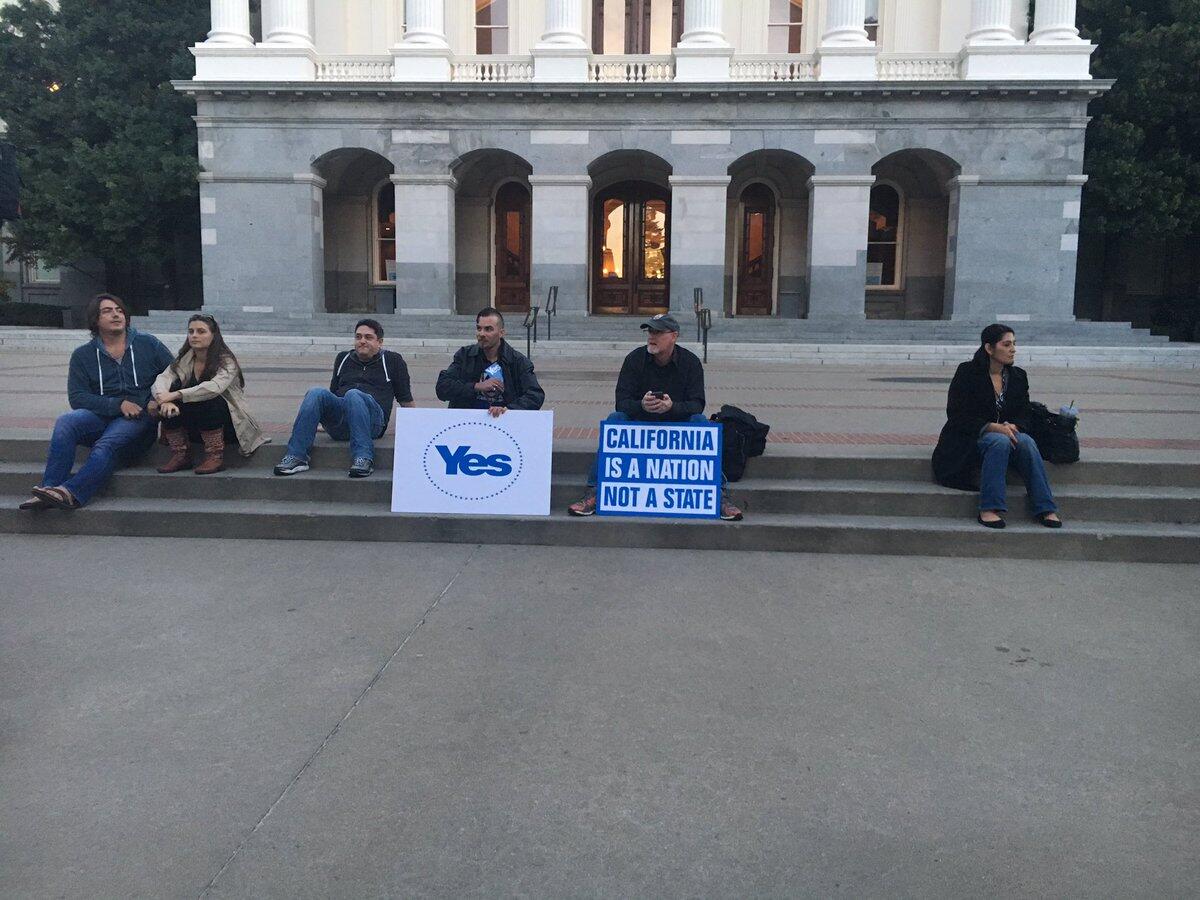
He said the money California pays in federal taxes isn’t adequately supporting aging infrastructure and public programs in the state.
Evans and about a dozen other supporters paced the sidewalk in front of the Capitol on Wednesday evening, chanting, “What do we want? Calexit! When do we want it? Now!” Some wore dark blue Yes California shirts.
Yes California was one of several groups protesting the outcome of the election at the Capitol on Wednesday evening. Another group formed a large semicircle to share postelection feelings on the Capitol steps. Two women held “Free Hugs” signs. In the street, a group of dozens of protestors blocked traffic and chanted “F--- Trump” while waving posters that said “Not my president.”
Evans said the Yes California group planned the event months in advance and would have protested regardless of the result. But he said Donald Trump’s victory Tuesday strengthened their case and generated additional support.
“Now that America chose Trump, no one is debating with us that America is failing,” Evans said. “So then the question becomes, do you want to go down with the sinking ship, knowing that you have a ship that’s able to sail the international economy on its own?”
In conservative Utah, Trump underperforms, but so does McMullin
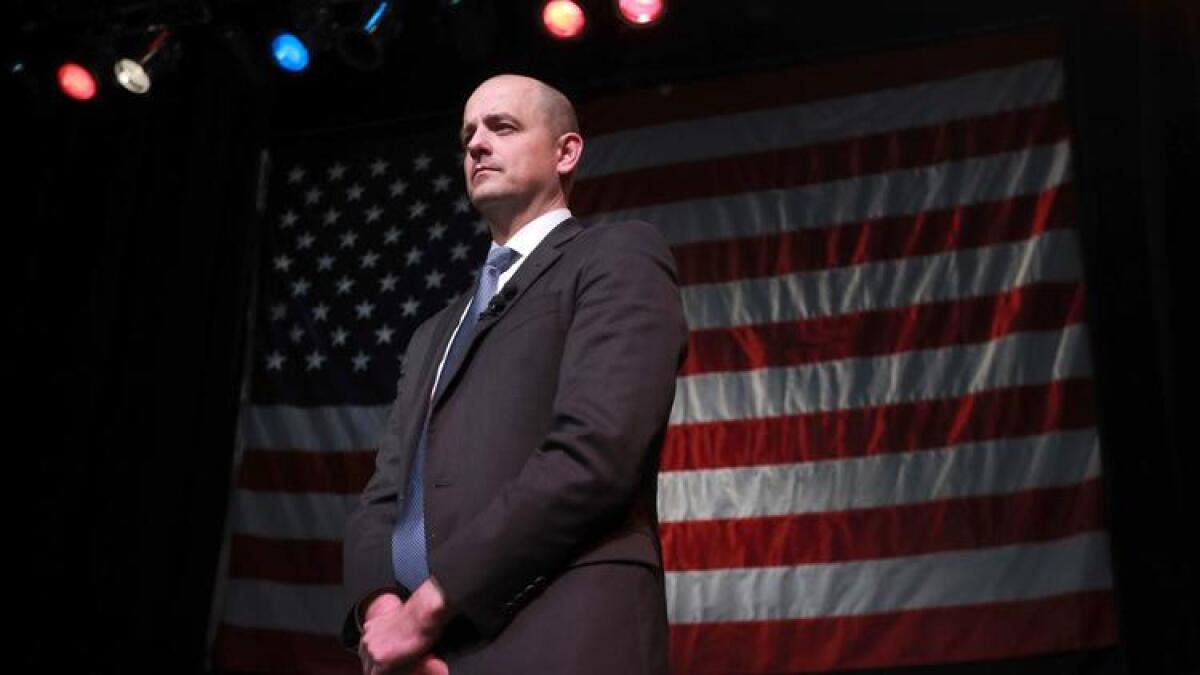
Seeing Utah’s electoral votes go to the Republican candidate on election day in any other year, Logan Sisam would have gone to bed and felt pretty good about that fact.
Utah knew exactly what it was and he knew what he was: a Republican Mormon living in a conservative state.
Donald Trump upended all of that for him.
Thousands protest Trump in New York
Although he lives in a penthouse high above the crowd, it might be tough for President-elect Donald J. Trump to get some rest when he gets home.
Thousands of protesters chanted “New York hates you” and “Not my president” in front of Trump’s flagship New York building, the Trump Tower.
Protesters filled Fifth Avenue for five blocks, essentially closing down an iconic, much-visited neighborhood of midtown Manhattan. Those who weren’t holding signs raised their middle fingers — many of them taking selfies of the gesture — toward the glassy, black 58-story tower that had become a symbol of the Trump candidacy.
Reaction from China: ‘President Trump Shocks America’

The front page of the Global Times, a Communist Party-run newspaper, led with the headline “President Trump Shocks America” on Wednesday.
Trump head burned in effigy outside L.A. City Hall
Assembly Speaker on Brown’s loss: ‘It’s a shame’
It’s a shame we lost a great member...As far as I’m concerned, it really says something about the top-two. It’s a pretty volatile system.
— Assembly Speaker Anthony Rendon (D-Paramount), on defeat of San Bernardino Assemblywoman Cheryl Brown
Still no call in U.S. House race between Ami Bera and Scott Jones

The race between U.S. Rep. Ami Bera (D-Elk Grove) and Republican challenger Sacramento County Sheriff Scott Jones is still too close to call.
“The race is far from over,” Jones said in a statement Wednesday. “The most important thing is for every vote to be counted.”
Returns Wednesday afternoon showed Bera ahead by 2,094 votes — a less-than 2-percentage-point lead. But elections officials in Sacramento County, which contains Bera’s district, have hundreds of thousands of ballots still to count, said assistant registrar of voters Alice Jarboe.
They may also be waiting on outstanding ballots. Ballots postmarked by election day that arrive by Monday can be counted, meaning the Northern California congressional race might not be called this week.
“I feel pretty confident about where we are,” Bera said, noting his last race took more than a week to call.
In Bera’s 2014 election, 39% of registered voters in his district were Democrats and 36% were Republican, according to data from the California Target Book, which analyzes state congressional and legislative races. Nearly 20% registered with no party preference.
Bera eked out a narrow victory in that election, winning by less than a percentage point.
“That is, in fact, a district that could swing either way,” said Target Book publisher Darry Sragow, a longtime Democratic strategist. “It is a genuinely competitive district.”
The California House race is one of two the Associated Press still had not called Wednesday afternoon. The other is between U.S. Rep. Darrell Issa (R-Vista) and Democrat Marine Col. Doug Applegate. As of Wednesday afternoon, Issa was leading Applegate by about 4,000 votes.
John Myers contributed reporting.
Bernie Sanders, with a caveat, says progressives ready to work with President-elect Trump
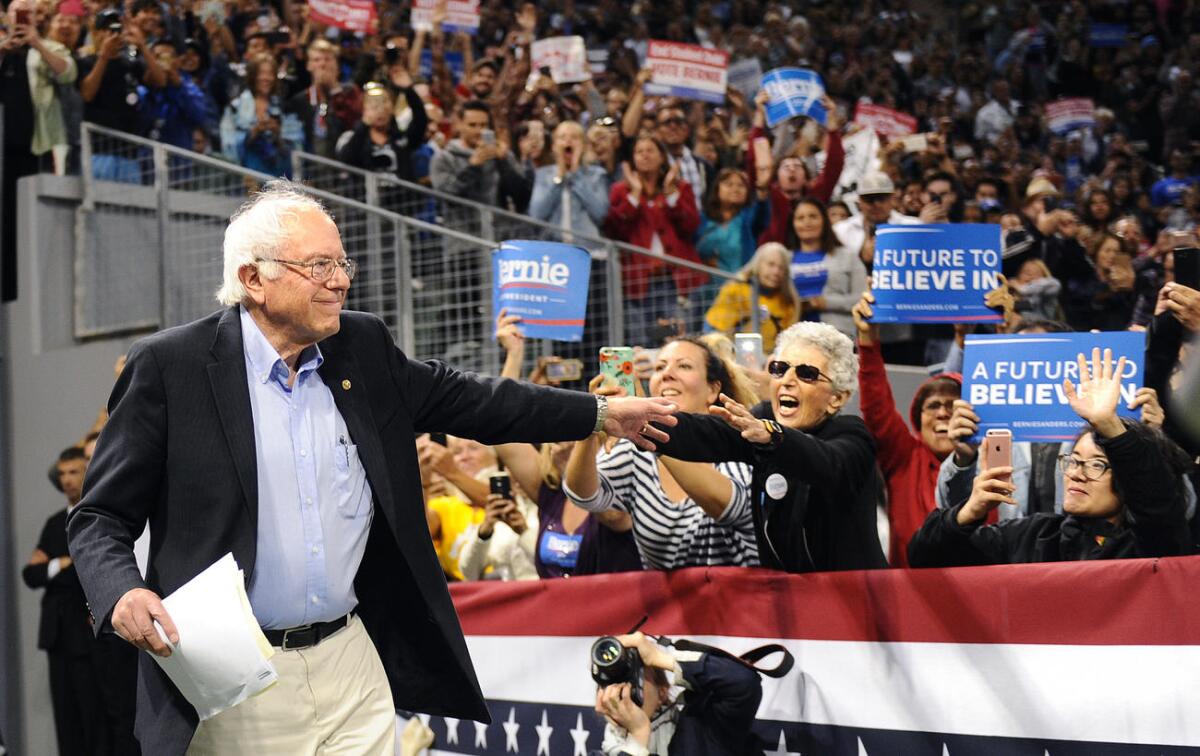
Both men tapped into a populist movement that eschewed establishment politicians this election.
And now, Vermont Sen. Bernie Sanders says he is prepared to work with President-elect Donald Trump.
Trump “tapped into the anger of a declining middle class that is sick and tired of establishment economics, establishment politics and the establishment media,” Sanders, who gained a loyal and youthful liberal following in his bid for the Democratic presidential nomination, said in a statement Wednesday. “People are tired of working longer hours for lower wages.”
“To the degree that Mr. Trump is serious about pursuing policies that improve the lives of working families in this country, I and other progressives are prepared to work with him,” Sanders, a supporter of Hillary Clinton, the Democratic nominee, said.
But, he added, “to the degree that he pursues racist, sexist, xenophobic and anti-environment policies, we will vigorously oppose him.”
Throughout the presidential campaign Trump used charged rhetoric against, among others, Mexican immigrants, Muslims and women. Trump has insisted he will work to unite the country as president.
After decades of Republican victories, here’s how California became a blue state again
California hasn’t always been a lock for the Democratic presidential nominee. Republicans won the state in nearly every presidential election between 1952 and 1988. Ahead of an election that could see more blue in the Golden State than ever before, here’s a look at how Democrats gained, lost and won back California.
Khanna on his election to Congress: “I don’t think my parents would have ever imagined it.”
For decades, Mr. Honda has stood up for the rights of Arab Americans, Iranian Americans, Chinese Americans, Korean Americans and transgender Americans, even when it wasn’t the popular thing to do. That the son of Indian immigrants could run against a Japanese American survivor of internment to be the political face of Silicon Valley suggests just how far America has come. I don’t think my parents would ever have imagined it.
— Ro Khanna, declaring victory in the 17th Congressional District race over incumbent Michael Honda
Rep. Mike Honda on his loss: ‘Now is the time to come together’
All the work I have done in my career, every decision I have made, every action I have taken has been to give all Americans the tools and conditions to build a country that works for everyone.... I congratulate my opponent on his victory in this hard-fought campaign to represent the people of California’s 17th Congressional District. Now is the time to come together as a party and unite around the progressive values we hold dear.
— Rep. Mike Honda (D-San Jose), conceding to challenger Ro Khanna
Activists vow to fight Trump’s presidency
Less than a day after Donald Trump won the presidential election, some activist groups are vowing to fight his presidency.
Bend the Arc Jewish Action, a social justice organization, released a statement Wednesday saying it would accept Trump’s win as legal but “cannot call the idea of Donald Trump as president acceptable.”
The group said it was prepared to protest against his decisions as president after a “campaign of hate.”
“It is possible that actions of this administration will demand a response involving widespread use of peaceful direct action. The future is uncertain, the stakes are high, and we must be willing to be courageous because the consequences of our decisions will be great,” Bend the Arc Jewish Action CEO Stosh Cotle said in a statement.
The organization was among dozens of progressive faith groups that had come out against many of Trump’s campaign promises, including his proposed restrictions on Muslims immigrating to the U.S. and suggestion that he may encourage surveillance of mosques.
Leaders of the Black Lives Matter movement, which Trump has accused of calling for the death of police officers, and which he has said he would consider having investigated by the Department of Justice, said they were organizing on Wednesday for a long-term fight against Trump policies.
“Funders, and those in relationship to funders, encourage a meeting of the minds. A multi-year investment into the thought leadership of people of color and our committed allies. Please. Now,” Shanelle Matthews, the director of communications at the Black Lives Matter network, said in a Facebook post.
Color of Change political action committee, a racial justice organization, said it was emboldened by Trump’s win to amp up its efforts.
“Will not allow Trump and his dangerous political coalition to slow, much less stop, the fierce efforts of black communities to make our country more just and fair,” spokesman Rashad Robinson said in a statement.
Thousands of social media users were tweeting and posting to Facebook on Wednesday with the hashtag #NotMyPresident. Many of those posts were anti-Trump. But some celebrated his win by sharing images of Hillary Clinton with the same hashtag.
“See you in court,” the American Civil Liberties Union tweeted and boldly declared against a large image of Trump’s face on its website.
With more than two months before the presidential inauguration, there was already a link spreading via social media to a petition on the White House website to impeach Trump.
As of 1:30 p.m., it had around 15,000 signatures.
In New Hampshire, Sen. Kelly Ayotte concedes to Gov. Maggie Hassan
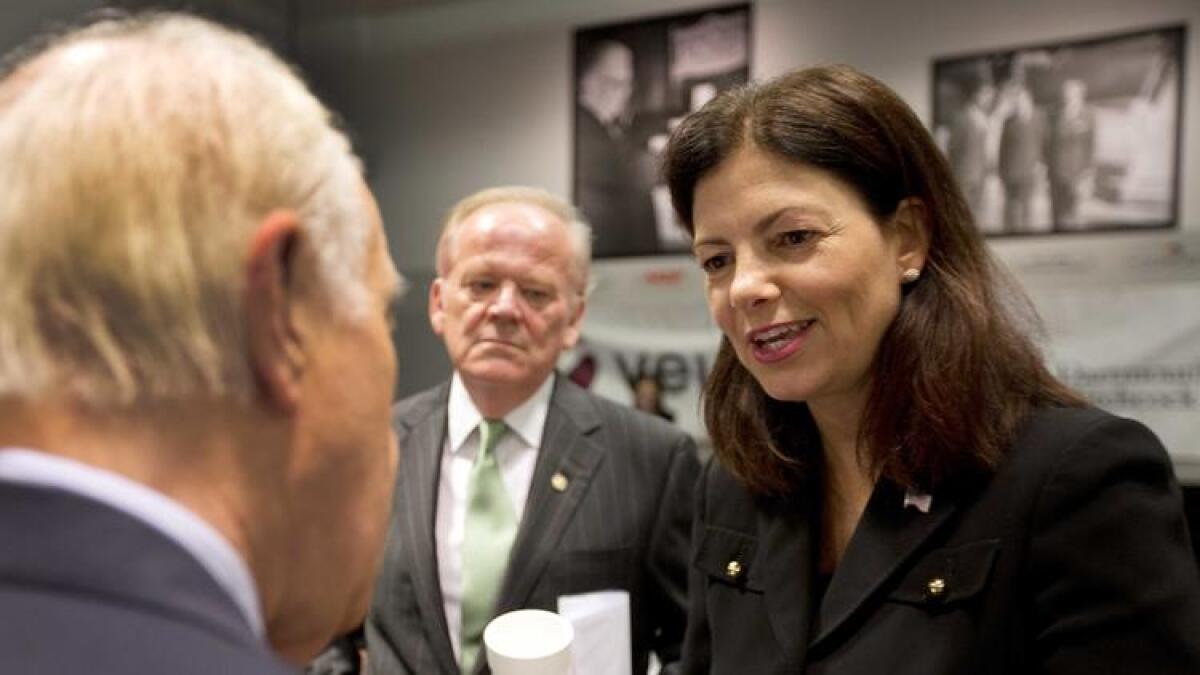
New Hampshire Republican Sen. Kelly Ayotte conceded late Wednesday to Democratic Gov. Maggie Hassan, giving Democrats a second seat formerly held by the GOP.
The race has still not been called by the Associated Press. With nearly all the precincts reporting, Hassan was outpacing Ayotte by about 700 votes.
In the final weeks of the campaign, Ayotte was assailed by Democrats for calling then GOP nominee, and now President- elect Donald Trump, a role model.
Other states held key Senate races. Here’s a look:
Pennsylvania
Sen. Pat Toomey (R) 48.9%
Katie McGinty (D) 47.2%
North Carolina
Sen. Richard Burr (R) 51.1%
Deborah Ross (D) 45.3%
Florida
Sen. Marco Rubio (R) 52%
Rep. Patrick Murphy (D) 44.3%
Illinois
Rep. Tammy Duckworth (D) 54.4%
Sen. Mark Kirk (R) 40.2%
Nevada
Catherine Cortez Masto (D) 47.1%
Rep. Joe Heck (R) 44.7%
2:04 p.m. This post was updated with Ayotte’s concession.
Prescription drug pricing measure Proposition 61 goes down to defeat
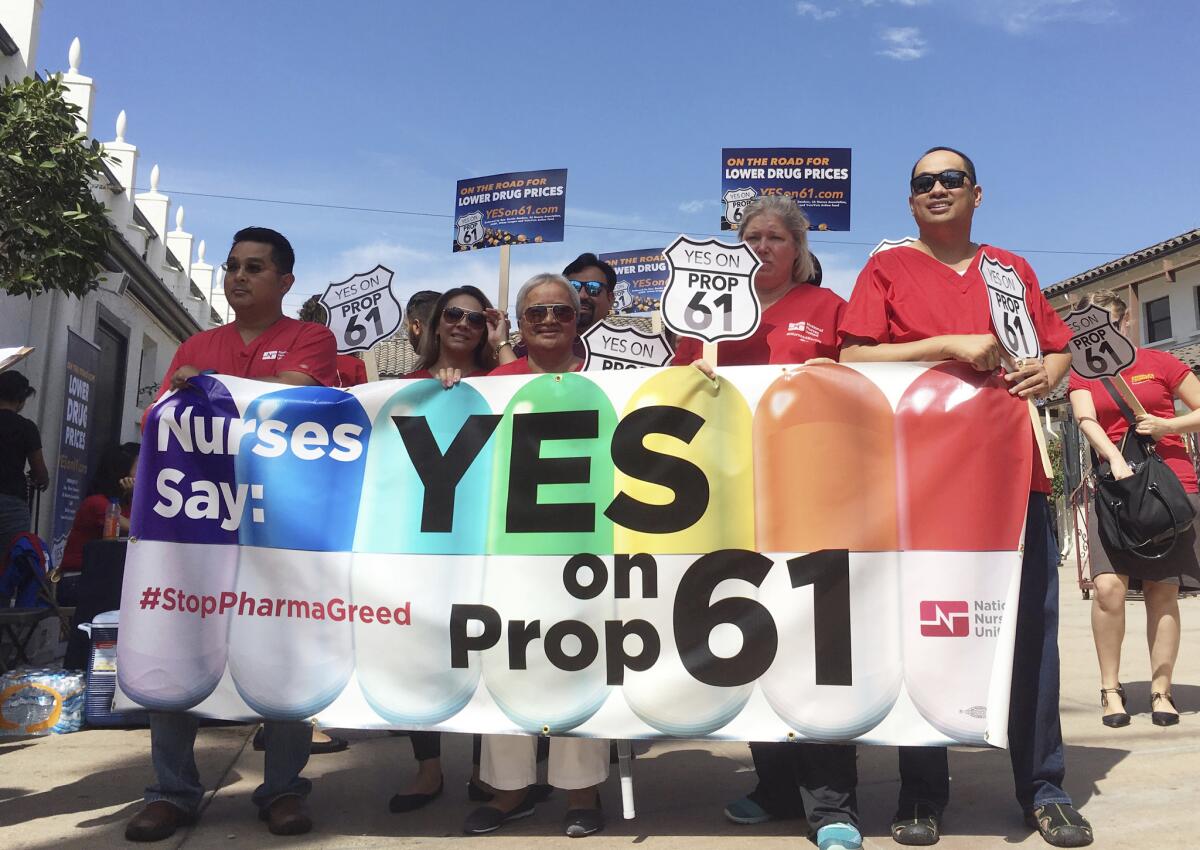
Proposition 61, the most expensive statewide initiative on the ballot this November, has been defeated by a 54-46 margin.
The ballot measure sought to lower prescription drug prices by requiring that state agencies pay no more for medicines than the federal Department of Veterans Affairs.
Proponents of the measure, funded almost entirely by the Los Angeles-based AIDS Healthcare Foundation, had argued that Proposition 61 would be a strong voter rebuke of pharmaceutical industry greed. Supporters included Vermont Sen. Bernie Sanders, who campaigned up and down the state for the measure.
Drug companies led the campaign opposing the proposition, raising a record $109 million to defeat the measure. They argued the initiative could lead to higher drug costs for veterans and seniors if the pharmaceutical industry refused to sell the state medicines at lower prices.
Proponents of the measure raised more than $19 million to support it, and fundraising figures for both sides made it one of the priciest ballot measures in California history.
Senate leader McConnell suggests Trump can undo Obama actions ‘unilaterally’ without Congress
One way Republicans in Congress could avoid messy infighting on issues where they have differences with Donald Trump is to simply step aside and let the new president do the job.
Think of it as outsourcing Congress.
Senate Majority Leader Mitch McConnell suggested as much Wednesday when he told reporters that many of the GOP’s top priorities with the Trump administration could be done “unilaterally” by Trump – much the way some of President Obama’s top accomplishments were put in place.
“Much of this can be done alone because much of the problem has been created by this [presidential action] alone,” McConnell said at a news conference at the Capitol on Wednesday.
Repealing Obamacare, rolling back administration’s regulations — including the landmark clean coal plan and others — are among top priorities of Republicans. They believe reversing those will boost the economy.
“We need to undo much of that,” McConnell said.
But on one of the most contentious issues of the election — Trump’s promise to deport immigrants in the U.S. illegally and doing away with Obama’s executive actions that give some permission to live and work here — McConnell declined to address that divisive issue.
“I’m not going to discuss the immigration issue today,” McConnell said when asked about Trump’s ideas for those in the country illegally.
Before the election, House Speaker Paul D. Ryan rolled out an ambitious “Better Way” agenda — a hundreds-page-thick wish-list of proposed tax breaks, regulatory reforms and national security measures that could serve as the blueprint for a new GOP government.
But Trump and congressional Republicans have differences on many issues, and cobbling together agreement in the House and Senate has always proved difficult for GOP leaders.
McConnell does expect Trump to ask the Senate to confirm a nominee for the vacancy on the Supreme Court early in the administration. He also expressed hope for tackling tax reform, but said a big Pacific trade pact negotiated by Obama would not be voted on during the final weeks of this Congress.
McConnell said he had talked to Trump on Wednesday and “would like for him to get off on a positive start.”
“Where we have differences of opinion, I want to express them privately,” McConnell said. ‘We are going to be enthusiastically supportive almost all the time.”
California’s legislative leaders on Trump’s win: ‘We woke up feeling like strangers in a foreign land’

California’s two legislative leaders vowed Wednesday to fight any attempt by the administration of President-elect Donald Trump to roll back the state’s achievements, but also said they were shocked by the results on election night.
“We woke up feeling like strangers in a foreign land, because yesterday Americans expressed their views on a pluralistic and democratic society that are clearly inconsistent with the values of the people of California,” said the statement from Senate President Pro Tem Kevin de León (D-Los Angeles) and Assembly Speaker Anthony Rendon (D-Paramount).
The two men were staunch supporters of Hillary Clinton. De León traveled to swing states several times to campaign for the defeated presidential candidate.
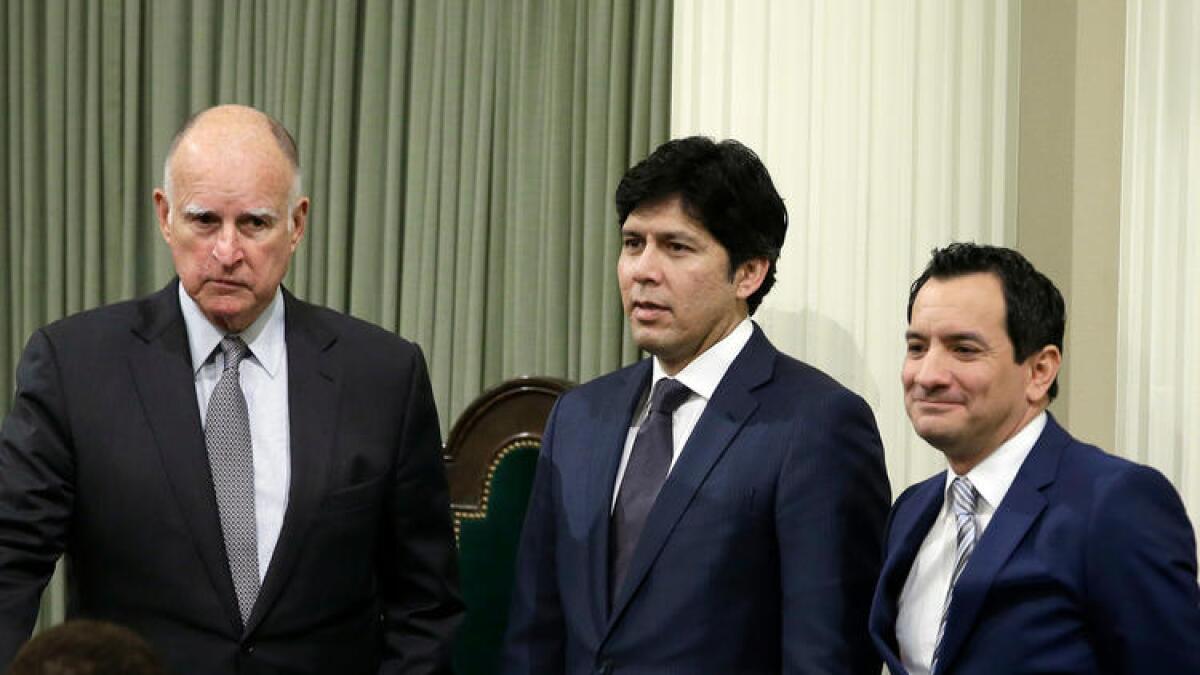
On Wednesday, state-government watchers were already trying to assess the impact of a Republican sweep of the White House and Congress. Key issues, such as California’s embrace of the Affordable Care Act and aggressive climate change regulations, could face tougher scrutiny in the weeks and months to come.
“We will maximize the time during the presidential transition to defend our accomplishments using every tool at our disposal,” the two legislative leaders wrote.
They ended their joint statement with what could be the first salvo in the political and policy battles to come.
“America is greater than any one man or party,” they wrote. “We will not be dragged back into the past. We will lead the resistance to any effort that would shred our social fabric or our Constitution.”
Loretta Sanchez concedes -- and hints at a return

Orange County Rep. Loretta Sanchez conceded the U.S. Senate race Wednesday morning to Kamala Harris, congratulating the state attorney general for the win and pledging her support.
Sanchez made the announcement in press release, one night after declining to concede even after the Associated Press declared Harris the winner.
“Today, I called Ms. Kamala Harris to congratulate her on her win to the U.S. Senate,” Sanchez said in the statement. “As she prepares to head to Washington to represent the people of California, I offer my support.”
According to preliminary election results, Harris won the Senate race in a landslide -- beating Sanchez by 25 percentage points and winning 56 of California’s 58 counties, including Sanchez’s home county of Orange.
Sanchez, who has served in Congress for two decades, thanked her supporters and said she plans to spend the next few weeks with her family.
“Although we don’t know what our future will be, I can tell you that this is not the last that people will see of me,” Sanchez said.
Activists say vote in California and other states gives momentum to legalize marijuana elsewhere in the U.S.

Tuesday’s approval of marijuana legalization initiatives in California and three other states has given momentum to efforts to decriminalize pot in other parts of the U.S., national activists said Wednesday.
However, the proponents are concerned that the election of Republican presidential candidate Donald Trump could reverse the federal government’s past policies that have had the effect of encouraging states to legalize pot.
Recreational marijuana use ballot measures were also approved Tuesday in Massachusetts and Nevada, and another is ahead in Maine, although that one may face a recount. Arizona was the only state to reject an initiative that would have allowed possession of recreational marijuana.
Florida, North Dakota and Arkansas approved medical marijuana initiatives.
“It was really a remarkable set of victories last night,” Ethan Nadelmann, executive director of the Drug Policy Alliance, said in a conference call by activists with reporters.
“There is a massive sense of momentum in this regard,” he added. “I think Americans have become persuaded, by and large, that marijuana prohibition makes no sense.”
Lynne Lyman, California state director for the group, noted that 40 million people now live in states where recreational marijuana use is allowed.
In California, 56% of voters approved Proposition 64. It was approved in 37 of the 58 counties.
“We did something really significant last night in California,” Lyman said. “And we did it in a huge way.”
Kevin Sabet, president of the opposition group Smart Approaches to Marijuana Action, said it was no surprise that “deep pocketed pro-marijuana investors prevailed in California.”
But he held out hope for the new administration of Republican President-elect Donald Trump to change federal policies that have encouraged states to adopt legalization laws.
“We’re really in a whole new unknown world here,” he said.
The election is likely to put additional pressure on the federal government to address marijuana issues, but activists also are worried about the change of administration.
“What gives me real concern is the election of Donald Trump,” Nadelmann said. “Donald Trump is totally unpredictable on this issue.”
Trump said during the primary election that he would respect states that adopt their own marijuana laws, but some in his inner circle, including former New York Mayor Rudy Giuliani, have pushed for tough enforcement of drug laws in the past, Nadelmann said.
That, he said, could “throw a wrench” into future efforts to legalize marijuana in additional states.
We don’t know how many ballots are left in California, and may not know until next week
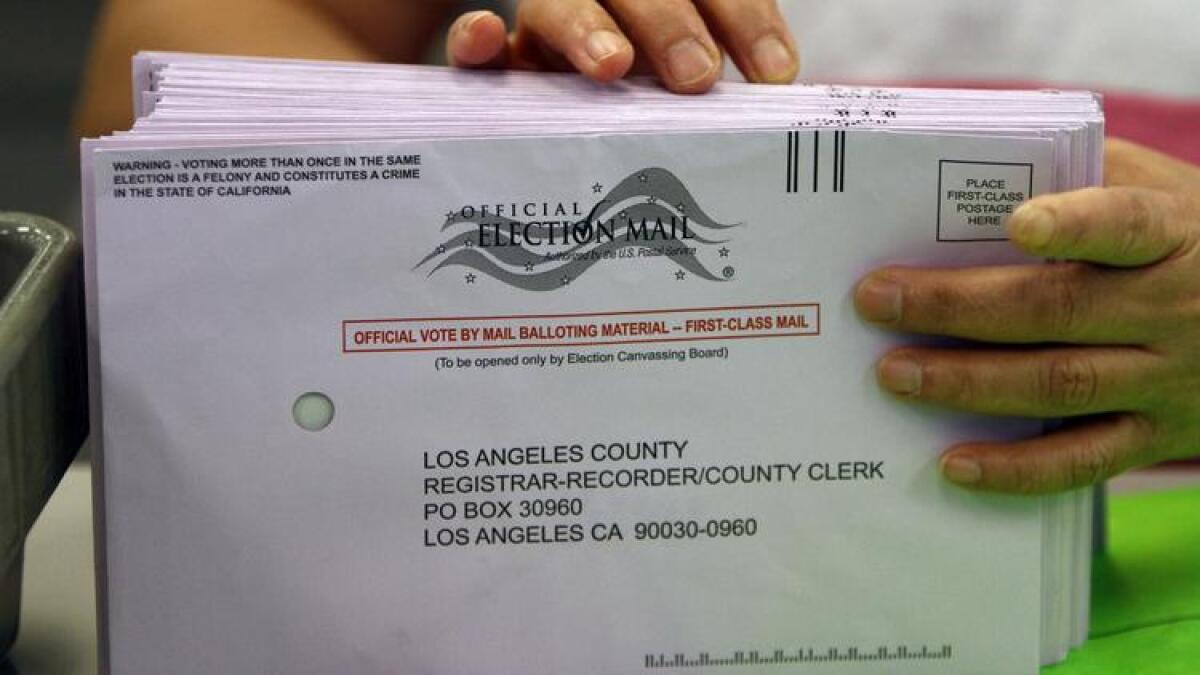
California elections officials continued to sift through ballots cast by mail on Wednesday morning, and may not have a full handle on how many are left until Monday.
With the rise in absentee voting in California — it now accounts for more than half of the state’s voter registration — election day has largely become an election month. Voters are casting their ballots as early as two weeks before the day of the election. They are also holding them longer, many turning them in to elections officials right before the 8 p.m. closing of polling places on election night.
This year, a new state law has kicked in that allows ballots to be counted that arrive in the mail up to three days after the election, as long as they are postmarked by Nov. 8. Normally, that would mean ballots must arrive by the end of Friday.
But there’s a catch: Friday is Veterans Day, a federal and state holiday. State elections officials have extended the deadline to the close of business on Monday, Nov. 14.
A number of local and state races remained close as Tuesday night came to a close. Though those numbers will undoubtedly shift as ballots already on hand are counted, there’s no way to know how many more will show in mail deliveries by next week.
State begins to tackle cash-handling issue now that recreational pot is legal in California

The passage of Proposition 64 gives urgency to the need to find a system for handling the hundreds of millions of dollars now generated in cash by the marijuana industry in California, according to Fiona Ma, chairwoman of the state Board of Equalization.
The issue arises because federally regulated banks will not accept drug proceeds, so pot shops can’t write bank checks or use credit cards to pay fees and taxes to the state.
In addition to pot shops having difficulty handling their deposits, the state faces a difficult situation accepting up to $1 billion in annual taxes in cash.
“We are going to have to figure out the cash issue and how we are going to accept the cash.” Ma said. “We are working on different options right now to try to alleviate the cash problem.
One idea is to have a tax official stationed at branches of Bank of America, which handles tax proceeds for the state, so the official can accept cash payment of taxes and then deposit it as state revenue. Ma said she was also looking at possibly having Department of Motor Vehicles locations accept tax payments in cash.
The issue also affects other state agencies, such as the Department of Consumer Affairs, that are not set up to accept cash payments for license fees that would be paid by those getting state permits to grow, transport and sell marijuana.
Ma said her agency would probably try again to get legislation approved to allow her office to accept cash for other agencies’ license fees. “If you want to get a state permit from a state agency, the state agencies are not equipped to take cash payments,” she said.
There is one benefit under the measure for current holders of medical marijuana cards. Proposition 64 exempts them from state sales taxes.
Measure to speed up the death penalty leads, and the bid to end executions fails

California voters on Tuesday defeated a ballot measure to repeal the state’s death penalty, while a measure that would expedite and amend the death penalty process narrowly leads with more ballots left to be counted.
The final outcome will conclude a closely watched ballot race to address what people on both sides of the debate have agreed is a broken system.
Proposition 62, which would have replaced capital punishment for murder with life in prison without parole, garnered 46.1% of the vote.
Proposition 66 intended to speed up executions by designating trial courts to hear petitions challenging death row convictions, limiting successive petitions and expanding the pool of lawyers who could take on death penalty appeals.
With all precincts reporting, it currently has the approval of 50.9% of voters, but provisional and other ballots remain to be counted.
The outcome reflects similar findings by a USC Dornsife/Los Angeles Times poll, which found California residents, like the nation, remain very much divided on capital punishment, even as public opinion has shifted against the practice over the past 40 years.
This year, proponents of the measure to “amend not end” the death penalty system centered their campaigning efforts on emotional appeals from law enforcement and crime victims, who urged voters not do away with what they called the “last defense” against the “worst of the worst in society.”
But death penalty opponents, a diverse group of crime victims, celebrities and Silicon Valley entrepreneurs, argued the system could not be fixed. They pointed to a costly appeals process, the arbitrary application of the punishment and its impact on poor and minority communities.
Times staff writer Liam Dillon contributed to this story.
FOR THE RECORD: 11:11 a.m. This story and headline has been corrected to reflect that the Associated Press has not called the race for Proposition 66.
This story was originally posted at 6:31 a.m.
Muratsuchi defeats Hadley in Assembly race rematch
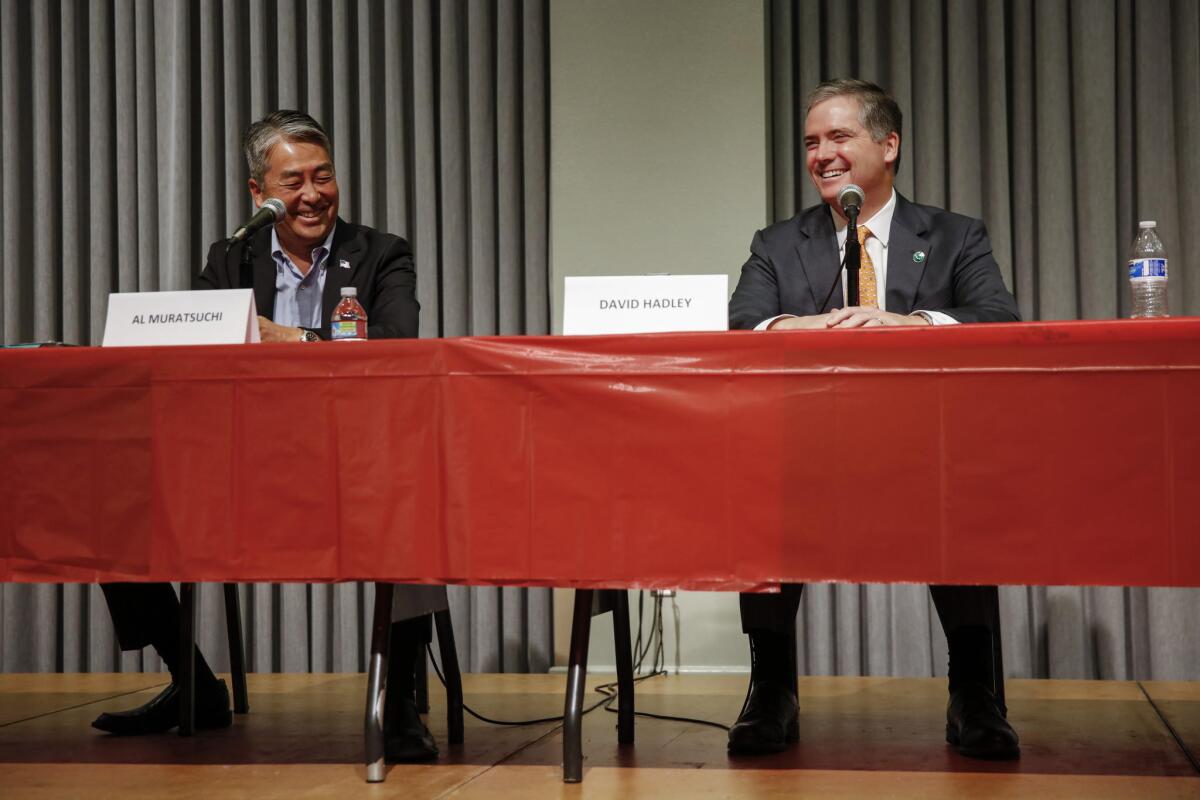
Assemblyman David Hadley (R-Manhattan Beach) was defeated in his rematch with challenger Al Muratsuchi, the Democrat he ousted in 2014.
Muratsuchi secured 53% of the vote with all precincts reporting, and the Associated Press called the race Wednesday morning.
The 65th Assembly District is a coastal swing district that tends to lean Democratic, and Hadley was widely considered to be one of the most vulnerable incumbents in the Assembly.
State and county Democratic committees spent nearly $3.3 million in an attempt to recapture the seat, which is key to their efforts to regain a super-majority in the Assembly. Muratsuchi was one of three Assembly candidates endorsed by President Obama.
The race had grown increasingly contentious, with Muratsuchi’s campaign filing a complaint alleging that Hadley’s campaign had illegally coordinated with an independent expenditure committee backed by Republican mega-donor Charles Munger Jr. That group, known as Spirit of Democracy, ended up dropping more than $1.5 million to oppose Muratsuchi and support Hadley.
Democrats tried to tie Hadley to Donald Trump, posting campaign signs that read “TRUMP HADLEY” and creating a website called hadleytrump.com. The Republican said earlier this year that he would not vote for Trump, and said Tuesday he cast a ballot for Libertarian candidate Gary Johnson.
Staff writer Liam Dillon contributed to this report.
Orange County voted for a Democrat for president for the first time since the Great Depression

It’s little comfort for Democrats who are devastated that Hillary Clinton lost the White House, but she managed to do something no Democrat has done since the Great Depression: win Orange County, a bastion of conservatism.
Clinton beat Donald Trump by nearly five percentage points, or 39,000 votes, in the county, which is a national symbol for the GOP — the home to Richard Nixon and the cradle of Ronald Reagan’s conservatism.
The last time a Democrat won the county was 1936. For decades, it was a GOP stronghold, with Republican presidential candidates routinely beating their Democratic rivals by double-digit margins.
But in recent years, as the county has grown more diverse and less conservative, the gaps have narrowed. President Obama came the closest to winning Orange County, losing to Sen. John McCain by 2.5 percentage points in 2008.
Front pages: Here’s how newspapers declared Trump’s presidential victory
Ellection coverage on the front pages of today’s newspapers are on display outside the Newseum in Washington, D.C. The victory of Republican presidential candidate Donald Trump surprised many in the country after weeks of polling data appeared to indicate Hillary Clinton was poised to win.
Raul Bocanegra will return to California Assembly
Assemblywoman Patty Lopez (D-San Fernando) has lost her seat to Raul Bocanegra, the former assemblyman she unseated in 2014.
Bocanegra received 61.1% of the vote with all precincts reporting, and the Associated Press called the race Wednesday morning.
------------
FOR THE RECORD
11:23 a.m.: An earlier version of this post said Lopez received 61.1% of the vote. Bocanegra received that amount.
------------
Lopez’s election to the Assembly was one of the biggest surprises of 2014. A local activist and political neophyte, she ran a bare-bones campaign funded in part by selling tamales and pozole, and shattered expectations that Bocanegra would coast to reelection.
It became a cautionary tale for incumbents who might be inclined to ignore their reelection races, with many who would typically be considered safe increasing their spending.
During her first months in office, Lopez faced calls to step down, struggled to retain staff and showed a distrust of the establishment.
She failed to win the endorsement of the California Democratic Party, which instead endorsed Bocanegra. In recent months Lopez had complained she didn’t “feel respected” by her Democratic Assembly colleagues, some of whom had endorsed and were campaigning for Bocanegra.
Los Angeles Times staff writer Liam Dillon contributed to this report.
Eloise Reyes ousts fellow Democrat Cheryl Brown from state Assembly seat
Assemblywoman Cheryl Brown (D-San Bernardino) has lost her long, expensive battle against fellow Democrat attorney Eloise Reyes.
Reyes secured 53.3% of the vote with all precincts reporting, and the Associated Press called the race Wednesday morning.
This was one of the most closely watched Assembly races of 2016, partly because it was seen as a proxy battle between environmentalists and labor unions, who supported the more progressive Reyes, and oil companies and business groups, who bankrolled committees supporting Brown.
Brown, who is a member of the Legislature’s informal moderate caucus of business-aligned Democrats, played a key role in watering down last year’s landmark climate change bill.
Labor groups and environmentalists helped fund an effort that spent more than $1.5 million in the general election to support Reyes and oppose Brown, dubbing her “Chevron Cheryl” and accusing her of doing the oil industry’s bidding.
Brown benefited from the bulk of the $6.1 million total independent expenditures in the race, most of it funded by Chevron and other oil companies and business groups.
Times staff writer Liam Dillon contributed to this report.
Dante Acosta defeats Christy Smith in Assembly race to represent Santa Clarita
Dante Acosta, a Republican and Santa Clarita city councilman, has defeated school board member Christy Smith, a Democrat, in their assembly race.
Acosta garnered 53.1% of the vote with all precincts reporting, and the Associated Press called the race Wednesday morning.
Democrats had hoped Smith could flip the seat held by Assemblyman Scott Wilk (R-Santa Clarita), who won his race for state Senate.
Less than two weeks before the election, Acosta faced allegations that he had sexually harassed a local GOP consultant, Jennifer Van Laar, who had worked for one of Acosta’s Republican opponents during the June primary.
The claims first came to light when local blog Sclarita.com published a partially redacted private email from Van Laar to Wilk’s wife discussing the allegations. The allegations threatened to touch two other competitive races in the Antelope Valley, those of Wilk and Rep. Steve Knight (R-Palmdale), both of whom were copied on the email.
The race in this reliably Republican district became a late surprise focus for state Democrats as they expanded their field of targets and their expectations of a negative “Trump effect” following favorable voter registration trends and Smith’s strong primary showing. State and county Democratic committees spent more than $1.4 million trying to help Smith win the seat.
When Wilk was reelected two years ago, Republicans had a more than 5-percentage-point edge over Democrats in voter registration in the district. By Tuesday’s election, that lead had dropped to just 1.7 percentage points.
Times staff writer Liam Dillon contributed to this story.
Trump’s victory assures a conservative majority on the Supreme Court
Donald Trump’s presidential victory preserves the Supreme Court’s narrow conservative majority by clearing the way for the new president to choose a jurist next year to fill the seat of the late Justice Antonin Scalia.
And with Republicans maintaining control of the Senate, Trump likely will have a free hand in selecting someone with strong conservative credentials, confident his nominee will be confirmed.
The election dashes the hopes of liberals, who lost their best opportunity in more than 40 years to create a majority on the high court.
It also provided a validation of sorts for the obstruction strategy of Senate Majority Leader Mitch McConnell (R-Ky.) and other Republicans, who refused for nearly nine months to consider President Obama’s nominee to fill Scalia’s seat, Merrick Garland, chief judge of the U.S. Court of Appeals for the District of Columbia Circuit.
The future of the Supreme Court’s ideological balance proved to be a crucial factor for many Republican voters. In exit polls, about 1 in 5 voters said the Supreme Court appointments were “the most important factor” in their decision, and those voters favored Trump by a 57% to 40% margin, according to ABC News.
Now, the court’s ideological balance should remain largely as it has been for the last decade, with Justice Anthony M. Kennedy holding the deciding vote in the court’s biggest cases.
Kennedy generally leans to the right on issues such as campaign spending, criminal law, the death penalty, religion, business regulation and gun rights. But he has joined the court’s four liberals to uphold gay rights and to protect blacks from housing discrimination.
Kamala Harris’ win may wind up as biggest landslide in a U.S. Senate race in California in more than 60 years
Ex-Assemblyman Anthony Portantino defeats longtime L.A. County Supervisor Michael Antonovich for state Senate seat

Longtime Republican Los Angeles County Supervisor Michael D. Antonovich lost a race for a state Senate seat against Democratic former Assemblyman Anthony Portantino.
Portantino garnered 57.5% of the vote with all precincts reporting and the Associated Press called the race Wednesday morning.
The race for the district representing parts of Burbank, Glendale, Pasadena and the San Gabriel Valley was a rare opportunity for Republicans to take a seat away from Democrats.
Outgoing incumbent Sen. Carol Liu (D-La Cañada Flintridge) was termed out.
Portantino was seen as the favorite, since Democrats hold a 15-percentage-point lead over Republicans among registered voters. But Antonovich’s long record in local government — he previously served in the state Assembly from 1972 to 1978 — and high name recognition had the potential to make the race close.
Stern and Bradford win L.A.-area state Senate races
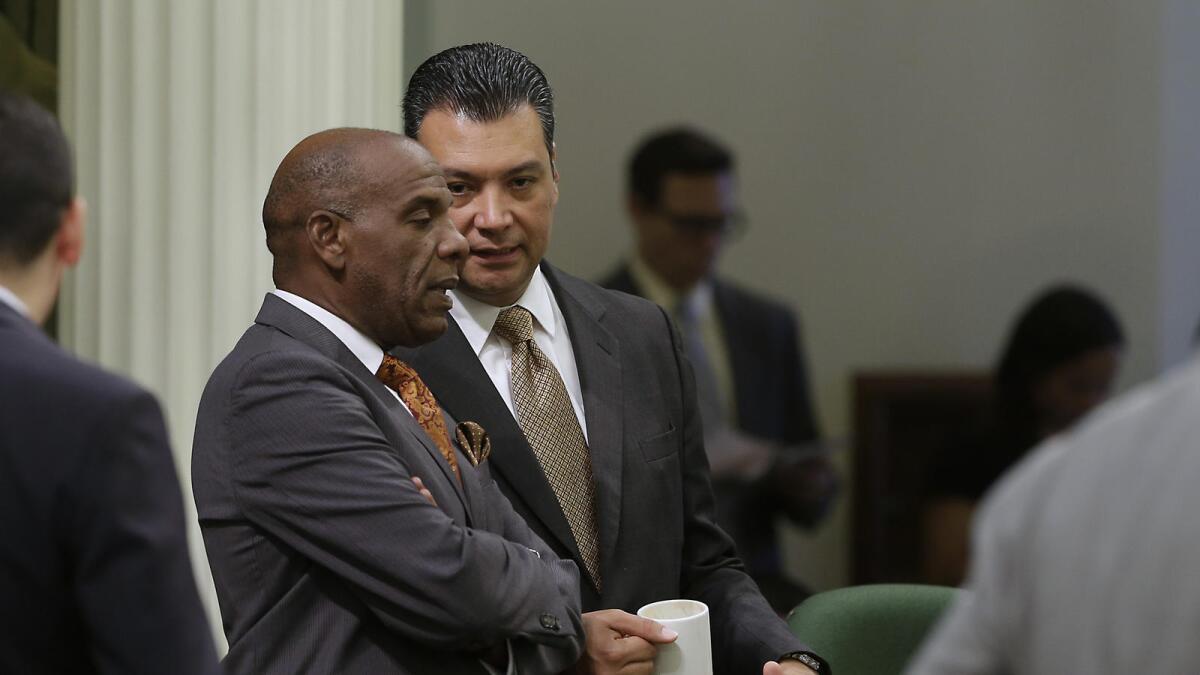
Henry Stern, an environmental attorney and policy advisor to state Sen. Fran Pavley (D-Agoura Hills) won a race to replace his boss, beating Republican businessman Steve Fazio.
Stern has big shoes to fill; Pavley is a stalwart in the environmental wing of the state Democratic Party and was behind some of the state’s landmark climate change laws.
Fifty-five percent of voters picked Stern to take over for Pavley in the coastal 27th Senate District.
In the South Bay, former Assemblyman Steven Bradford beat another former Assemblyman, Warren Furutani, in a race for the 35th Senate District.
Incumbent Isadore Hall did not run for reelection, opting instead for a failed bid at an overlapping congressional seat.
Bradford won with 54.3% of the vote.
Times staff writer Liam Dillon contributed to this story.
Clueless or calculated? Some questions about Melania Trump’s fashion choices

Are Melania Trump’s wardrobe choices completely clueless or cunningly calculated? Based on the white Ralph Lauren jumpsuit she picked for her husband’s victory rally in New York City in the wee hours of Wednesday morning, we’re starting to think it’s the latter.
Multiple sources have identified the outfit as an Italian-made, ruffled, one-shoulder jumpsuit with an asymmetrical ruffled overlay. And although it’s not technically a pantsuit, it’s certainly close enough in silhouette to bring Hillary Clinton’s go-to look to mind. Throw in the fact that it’s white — the color that many women chose to wear on election day as a symbol of women’s suffrage — and the symbolism is all the more powerful.
Is this sheer coincidence? Possibly. But after a day that saw social media filled with hashtags like #pantsuitnation, #pantsuitstothepolls
and #WearWhitetoVote, it’s hard to imagine that the former model from Slovenia had absolutely no idea that her wardrobe choice would be seen as referencing (or, if you’re feeling less charitable, co-opting) the sartorial symbolism of the day.
GOP Assemblyman Scott Wilk wins state Senate seat
Republican Assemblyman Scott Wilk beat Democrat Johnathon Ervin in the race to fill a seat previously held by Sen. Sharon Runner (R-Lancaster), who decided not to run for reelection citing health reasons. She died this year at the age of 62.
Wilk received 54.8% of the vote with all precincts reporting, and the Associated Press called the race Wednesday morning.
The Antelope Valley has historically been a stronghold for Republicans, but Democrats have made recent gains and currently have a four percentage point lead among registered voters.
California billionaire and political donor Tom Steyer made a late investment in the race through his super PAC, giving Ervin an unexpected $433,000.
Times staff writer Liam Dillon contributed to this report.
Obama pledges himself to smooth transition, calls for unity after Trump victory
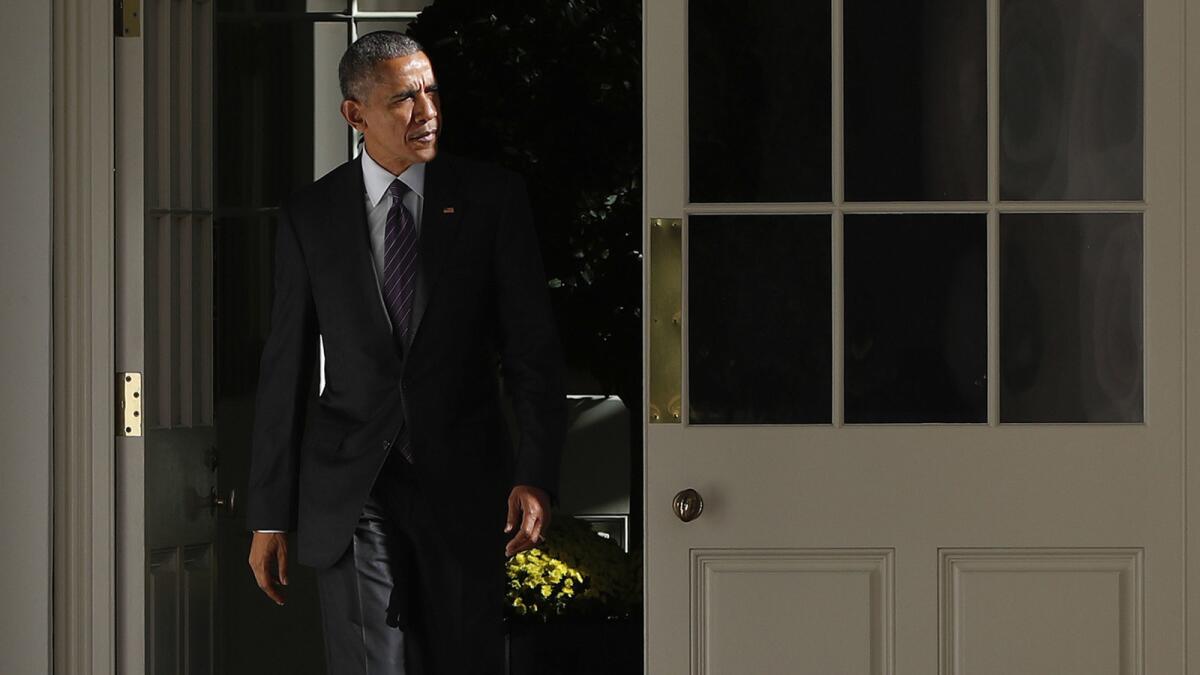
President Obama committed himself to a smooth transition of power to President-elect Donald Trump and urged Americans to unite after a bitter campaign as “one team.”
“We’re not Democrats first, we’re not Republicans first, we are Americans first,” he said in remarks in the Rose Garden moments after Hillary Clinton formally conceded defeat. “We are patriots first. We all want what’s best for this country.”
Obama noted that he and his Republican successor had no shortage of differences, but said he was now “rooting for his success.” He said he was “heartened” by the tone of Trump’s victory speech the night before, and in a private conversation between the two at 3:30 a.m.
“I hope that he maintains that spirit throughout this transition. And I certainly hope that’s how his presidency has a chance to begin,” Obama said.
It was a statement Obama never expected to give, but one he had promised he would make despite his deep reservations about Trump’s candidacy.
Clinton’s defeat is in many ways Obama’s, as well. He had staked his legacy on electing a Democratic successor who would cement his administration’s hardest fought accomplishments -- legislative, like the Affordable Care Act; diplomatic, like the Iran nuclear deal and international climate agreement; and those achieved through executive action, on immigration especially.
Obama campaigned aggressively on Clinton’s behalf -- more than any two-term president for his desired successor in recent history. He called Trump temperamentally unfit to hold his office, and urged his supporters to turn out to reaffirm his own victories.
“I may not be on the ballot this time, but everything we’ve done has been on the ballot,” he said at a closing rally for Clinton on Sunday in Kissimmee, Fla. Trump won Florida by one percentage point.
Now, Obama and his team will continue preparations long underway for a smooth transfer of power. Obama praised his predecessor, George W. Bush, for a smooth transition amid a global economic crisis, and committed himself Wednesday to do the same. The presidency “is bigger than any of us,” he said.
“The peaceful transition of power is one of the hallmarks of our democracy. And over the next few months, we are going to show that to the world,” he said.
On Thursday he will welcome the president-elect to the White House, a ritual of American democracy that will have added symbolic significance given the personal history between the two men. Trump spent years amplifying the lie that Obama was born outside the U.S., a tactic meant to undermine the legitimacy of the first black president.
California votes in favor of overturning Citizens United by passing Proposition 59
Voters approved Proposition 59, which instructs elected officials to overturn the U.S. Supreme Court’s landmark Citizens United decision that dramatically altered the way money can be spent on politics.
The Associated Press projects the ballot measure passed with 52.3% of the vote.
Proposition 59 is not legally binding and includes no punishment for California’s senators and representatives. While much of the delegation supports overturning the decision, some members have indicated they won’t comply with the voter instruction.
The Supreme Court’s 2010 Citizens United decision said money spent to influence voters that isn’t funneled through a candidate’s campaign is free speech, and the federal government can’t prohibit corporations and labor unions from doing it.
Elections since have become dramatically more expensive, with hundreds of millions of dollars pouring into campaigns in all levels of government by groups that don’t have to disclose their donors.
It took years of wrangling, two trips through the Legislature and a trip to the state Supreme Court for activists to get the measure on the ballot.
Gov. Jerry Brown let the bill that put the proposition on the ballot become law without his signature, saying in a 2014 message that he disagreed with the decision “but we should not make it a habit to clutter our ballots with non-binding measures as citizens rightfully assume that their votes are meant to have legal effect.”
Similar ballot measures have passed in Colorado and Montana. It also was on the ballot in Washington this year.
The Clintons wear symbolic pops of purple for her concession speech
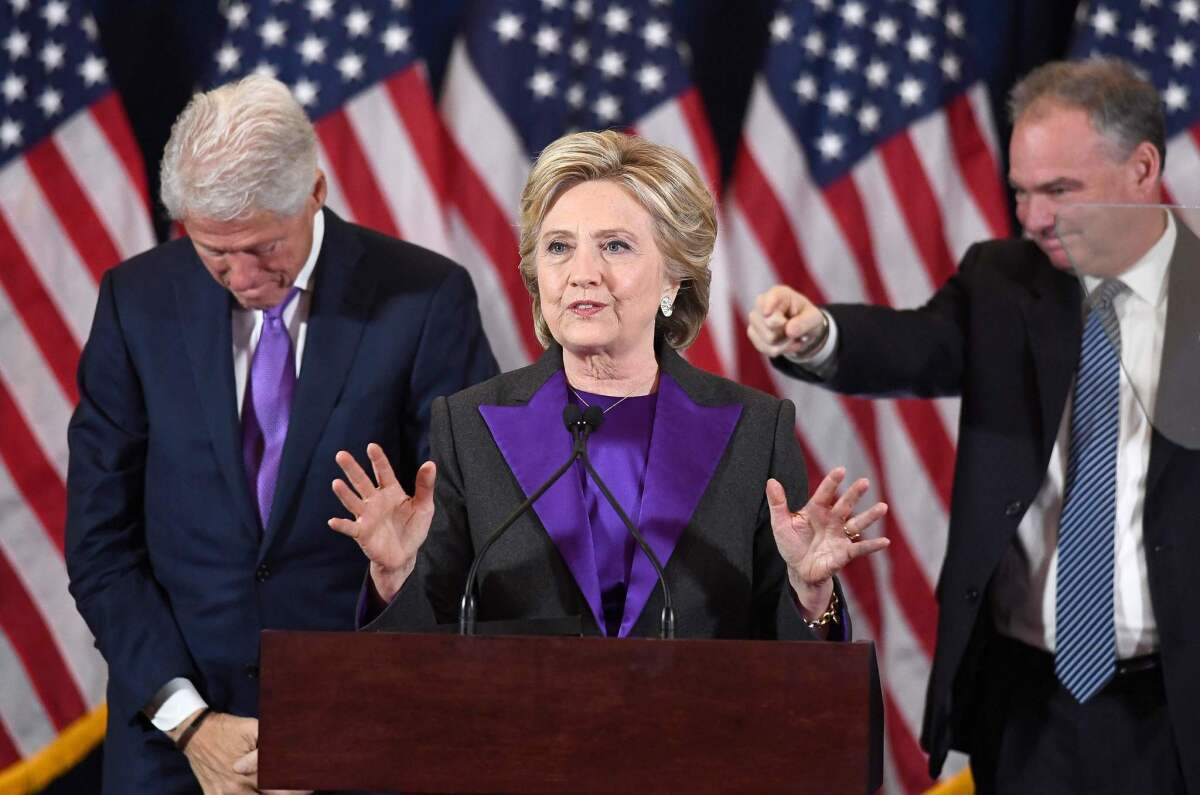
Democratic presidential nominee Hillary Clinton delivered her concession speech in a ensemble so symbolic and so perfectly framed in the TV screen that her message was loud and clear even if you couldn’t find the volume knob.
— Adam Tschorn, Times fashion writer
Clinton: ‘This is painful, and it will be for a long time’
Hillary Clinton never took the stage on election night at the Javits Center in New York, where she planned to declare its giant glass ceiling had been symbolically shattered. Instead, hours later she stood solemnly alongside Bill Clinton and running mate Tim Kaine at a nearby hotel, where she privately conceded the election.
On Wednesday morning, she offered some words of inspiration to the millions who supported her.
“I congratulated Donald Trump and offered to work with him,” Clinton said. “I hope he will be a successful president for all Americans.”
Clinton expressed pride in the campaign she ran but acknowledged the difficulty of the moment.
“I know how disappointed you feel, because I feel it to,” she said. “This is painful, and it will be for a long time. … We have seen our nation is more divided than we thought.
“We must accept this result and look to the future. Donald Trump is going to be our president. We owe him an open mind and the chance to lead.”
In a ballroom filled with campaign staffers, donors and close friends, she rallied her supporters not to despair, calling on them to fight for the constitutional values “we respect and cherish,” including freedom of expression and freedom of religion. The comments came following a divisive race that was overshadowed by Trump’s incendiary comments about women, Mexican immigrants and Muslims.
“We believe the American dream is big enough for everyone,” Clinton said. “For people of all races and religions, for men and women, for immigrants, for LGBT people and people with disabilities. For everyone. Our responsibility as citizens is to keep doing our part to build that better, stronger, fairer America.”
“This loss hurts,” Clinton said. “But please, never stop believing that fighting for what’s right is worth it.”
She also had a message directed at female supporters. “Nothing has made me prouder than to be your champion,” Clinton said. “I know we have still not shattered that highest and hardest glass ceiling. But someday someone will.”
“To all the little girls who are watching this,” Clinton said, “never doubt that you are valuable and powerful and deserving of every chance and opportunity in the world to pursue and achieve your own dreams.”
Speaker Paul D. Ryan promises unity between Trump and Republicans. Can he deliver?
House Speaker Paul D. Ryan campaigned for Donald Trump in the final days of the election on the promise of what a unified Republican government could accomplish in Washington.
Now he’ll have his chance to live up to the pledge.
“This is the kind of unified government we set out to deliver,” Ryan said Wednesday in a news briefing at his hometown of Janesville, Wis. “We’re going to hit the ground running.”
But Ryan’s promises for big deliverables from a government run by Republicans glosses over the challenges that have bedeviled the Republican Party since they took over the House in 2010 and the Senate in 2014.
Even with Trump in the White House, it’s no sure bet Republicans will be able to unify around specific legislative proposals.
For example, despite repeated promises to “repeal and replace” Obamacare, Republicans have never agreed on a proposal they could put forward for a vote.
Those challenges will only be intensified by Trump’s presidency because he is not a traditional Republican and has fluid positions on policy. Trump has broken with the party on key issues, including trade and federal spending on big-ticket items like infrastructure reform.
Democrats may see some areas of compromise with Republicans and a Trump administration. House Minority Leader Nancy Pelosi (D-San Francisco) on Wednesday mentioned infrastructure as one such opportunity. But on most policy proposals they are likely to mount a wall of opposition.
Ryan’s own future Wednesday appeared more secure. He said he had spoken twice to the president-elect as they plan the transition, despite their turbulent relationship.
Trump was never Ryan’s top choice for president. The buttoned-down speaker is the party’s top policy wonk, and he openly criticized Trump throughout the campaign.
Ryan once vowed not to campaign with Trump, only to ultimately spend the final days of the election urging voters to send Trump to the White House and Republicans to Congress.
“Trump heard a voice out in this country that no one else heard,” Ryan said Wednesday about the election upset.
Many Californians skipped voting in Senate race
The Democrat vs. Democrat U.S. Senate race between California Atty. Gen. Kamala Harris and Rep. Loretta Sanchez of Orange County failed to attract many voters.
How do we know?
Californians cast 1.1 million fewer votes in the Senate race than they did for president, according to results Wednesday morning with 99.4% of precincts reporting statewide in both elections.
While voters typically skip some down-ballot races, the Harris-Sanchez case seems especially stark.
For instance, in 2012 the margin between the presidential election and the U.S. Senate race between longtime Democratic incumbent Diane Feinstein and GOP challenger Elizabeth Emken was fewer than 500,000 voters. Feinstein won that election by more than 3 million votes.
Harris also has a strong margin of victory – an almost 2 million vote lead thus far.
The Harris-Sanchez race was a major test of the state’s relatively new open primary system where the top-two finishers regardless of political party advance to the runoff. This year was the first time since direct election of U.S. senators began in 1914 that there wasn’t a Republican in the runoff.
Supporters of the new system had argued that the plan would create more competitive races. But in this case, a lack of a Republican may have turned off more conservative voters.
Denham secures fourth term in Central Valley’s 10th District
With 52.4% of the vote, Rep. Jeff Denham has won another term in the Central Valley’s 10th Congressional District over Democratic beekeeper Michael Eggman, the Associated Press said.
The contest was initially considered likely a solid win for Denham (R-Turlock), but Democrats were emboldened in the final months of the race as nonpartisan election analysts gradually moved it to a “toss-up.”
While he never outright endorsed Donald Trump, Denham said throughout the race that he would support the Republican nominee, and Democrats worked to tar Denham with Trump’s rhetoric in the heavily Latino district.
This is the second time Denham and Eggman have faced off. Denham beat Eggman in 2014 by 12% and he insisted throughout the race that he’d win because his Modesto area constituents know he’s willing to break with his party on key issues, including immigration.
Voters there have historically tended to be Republican, but Democrats recently took the lead in voter registration in Stanislaus County.
Watch President Obama comment on the election

President Obama talks about the 2016 election and the future
Pelosi extends prayers, congratulations to Trump
House Minority Leader Nancy Pelosi (D-San Francisco) extended her congratulations and prayers to President-elect Donald Trump in a statement Wednesday.
“The peaceful transfer of power is the cornerstone of our democracy. After an election in which Donald Trump won the electoral college and Hillary Clinton won the popular vote, we have a responsibility to come together and find common ground. Only by recognizing and respecting the important contributions that all Americans make to our country’s success can we build an inclusive and stronger future for America,” she said.
Pelosi also hinted at a path forward on infrastructure needs, an issue both parties hope to address quickly.
“As President-elect Trump indicated last night, investing in infrastructure is an important priority of his,” she said. “We can work together to quickly pass a robust infrastructure jobs bill.”
Trump victory sparks protests across California
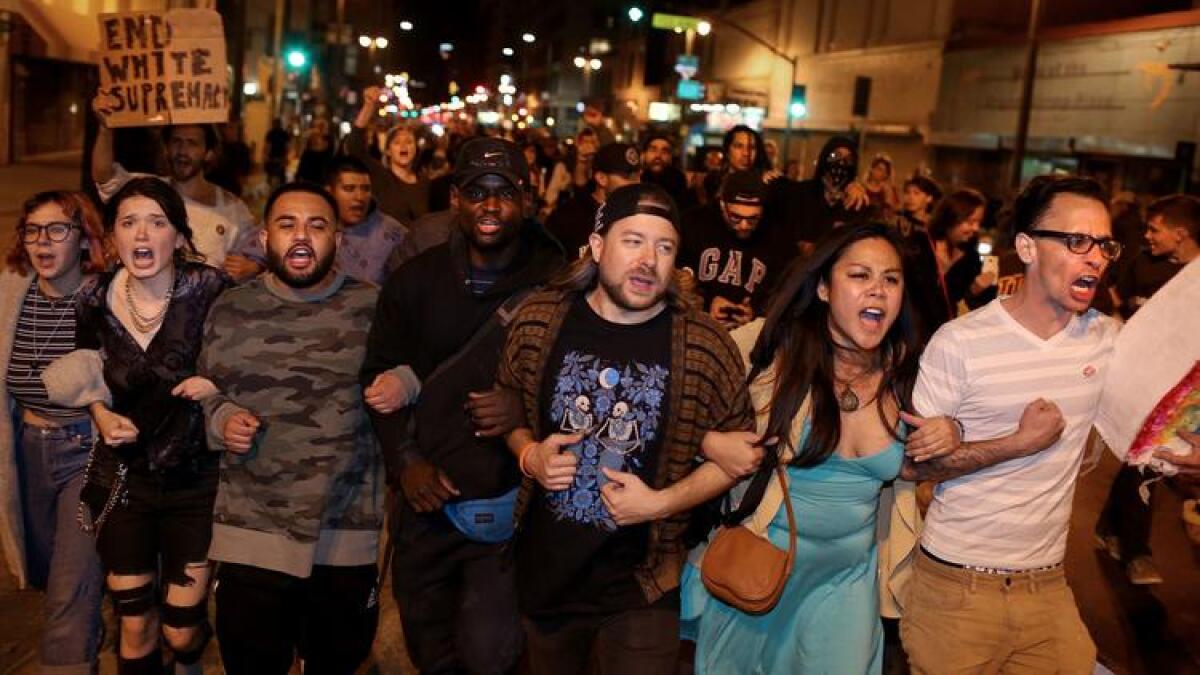
The election of Donald Trump to the presidency sparked protests early Wednesday across California, drawing crowds to city streets and college campuses.
The demonstrations reflected sadness, anger and bursts of rage. Crowds openly disavowed the president-elect and a few resorted to vandalism.
Shortly after Trump delivered a victory speech in New York, an estimated 2,000 people rallied at UCLA when two separate demonstrations merged into one, said UCLA police Sgt. Miguel Banuelos.
The group marched from campus through Westwood Village to a federal building on Wilshire Boulevard, Banuelos said. There were no arrests.
Bid to force porn actors to wear condoms in adult films fails

Voters rejected a measure requiring performers in adult films to use condoms during sex scenes by an almost eight percentage point margin, according to the Associated Press.
The measure was backed by the Los Angeles-based AIDS Healthcare Foundation and based on a similar initiative passed in Los Angeles County in 2012.
The group billed the measure as necessary to prevent the spread of disease on sets but found opposition, not only from the adult film industry, but also from both the state Republican and Democratic parties and groups like the San Francisco AIDS Foundation and AIDS Project Los Angeles.
Opponents argued that if the initiative became law, it would allow any Californian to sue adult film producers or others with a financial interest in a production if they thought condoms were not used, leading to frivolous lawsuits.
Others like state Sen. Mark Leno (D-San Francisco) said it would interfere with the work of a state advisory committee recently created to form new regulations that includes representatives from the adult film industry.
The foundation took a big jump into statewide politics this year, also backing Proposition 61, which seeks to lower the prices state agencies pay for prescription drugs. Proposition 61 also is losing.
Times staff writer Liam Dillon contributed to this report.
Pete Aguilar wins second term in San Bernardino area’s 31st Congressional District
Rep. Pete Aguilar (D-Redlands) won reelection to his 31st Congressional District seat in a rematch with Paul Chabot, a Republican military veteran who narrowly lost the 2014 contest for the then-open Inland Empire post.
The Associated Press called the race for Aguilar with 54.9% of the vote.
The district — and Aguilar — were thrust into the national spotlight in December after the shootings at the Inland Regional Center, the deadliest terrorist attack on U.S. soil since Sept. 11, 2001.
Chabot made his career in the military and combating terrorism a central part of his campaign, but Aguilar had early endorsements from San Bernardino Police Chief Jarrod Burguan and San Bernardino County Sheriff John McMahon.
Though the 2014 race was close, Democrats’ registration advantage in the district ballooned to about 12 percentage points this year. Aguilar’s campaign spent about $1 million more than Chabot, who they attacked for supporting Donald Trump in a district where 34% of voters are Latino.
Democrat Nanette Barragán wins bid in L.A.’s 44th District race to replace Hahn
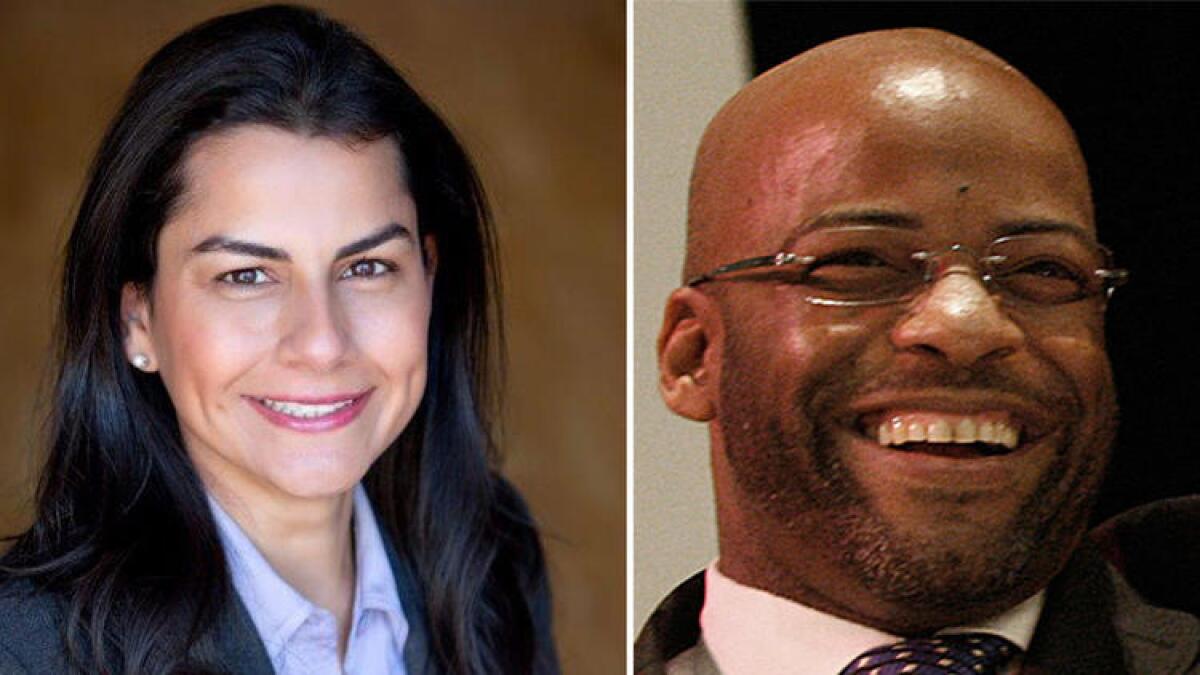
Former Hermosa Beach Councilwoman Nanette Barragán won a heated race against Compton state Sen. Isadore Hall to replace Rep. Janice Hahn (D-San Pedro).
The Associated Press called the race with 51.2% of the vote for Barragán.
Hall entered as a favorite, but Barragán closed the gap, framing herself as a progressive outsider while relentlessly attacking Hall, a 15-year veteran of Los Angeles politics, for his ties to special interests in the alcohol and tobacco industries and for benefiting from contributions from petroleum interests.
Hall and his allies accused Barragán of making racist attacks during the campaign, including using a racial slur.
Hall won the backing of the state Democratic Party as well as Lt. Gov. Gavin Newsom, former Los Angeles Mayor Antonio Villaraigosa and Gov. Jerry Brown. The governor cut a radio ad for Hall in October.
Barragán was endorsed by several Latino members of Congress as well as the Sierra Club and the League of Conservation Voters. She benefited late in the race from a surge of independent expenditures paid for by Women Vote!, a super PAC tied to Emily’s List, the national group that backs Democratic female candidates.
Rep. Steve Knight reelected in Los Angeles area’s 25th District
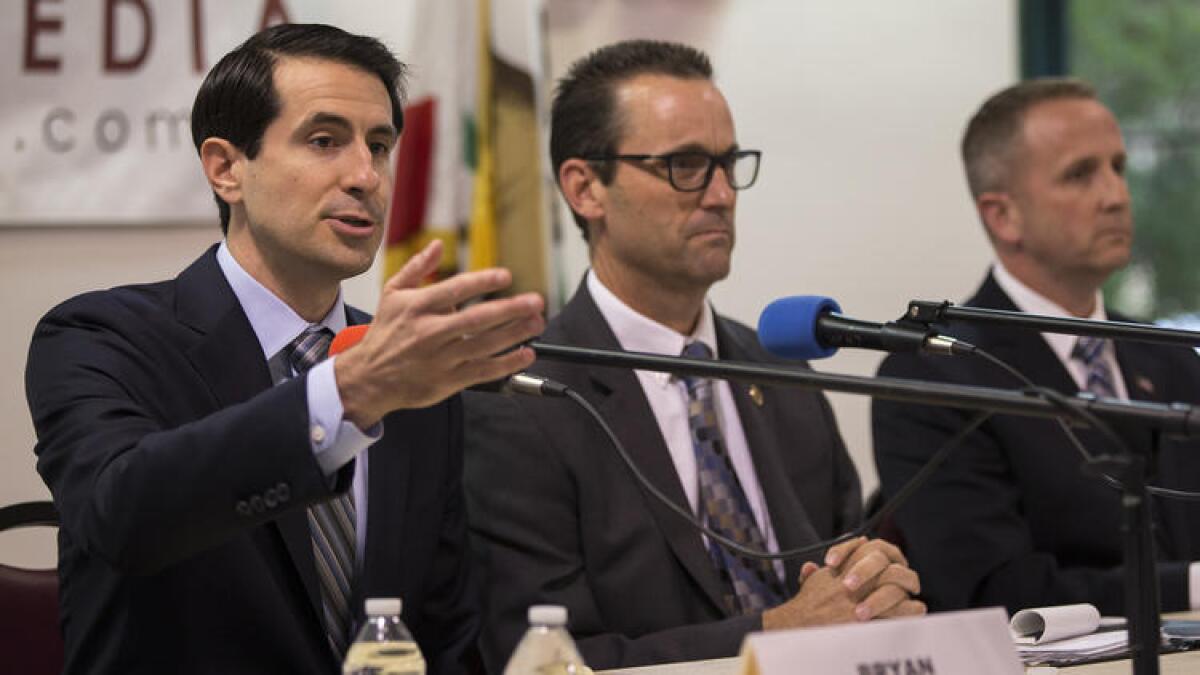
Rep. Steve Knight (R-Palmdale), considered one of the most vulnerable incumbents in California, kept his seat in Congress after a bitter and expensive fight with Democratic lawyer Bryan Caforio.
Democrats targeted the seat hoping the growth of Democrats and Latino voters in the high desert district coupled with the baggage of Donald Trump could turn the once reliably Republican district blue and help them win control of the House.
The Associated Press called the race for Knight with 54.3% of the vote.
Both parties pulled out the stops in the race, House Speaker Paul D. Ryan visited the district to raise money for Knight last month while President Obama cut a television ad endorsing Caforio in October. About $7.5 million has been spent in the race between the candidates’ committees and outside groups.
Caforio was hurt by criticism for moving into the district shortly before launching his candidacy and anger from some activists who backed Lou Vince, a Democrat Caforio defeated in the primary and who later said he would vote for Knight, not Caforio. Republicans also attacked his legal career.
Knight, meanwhile, was hit with ads highlighting his staunch opposition to abortion as well as comments he made in a May debate calling Social Security “a bad idea.” After being dogged by his opponent for months about whether he supported Trump or not, Knight said in October he would not vote for Trump.
Across the globe, caution and dismay greet Trump victory

Donald Trump’s election was greeted around the world Wednesday with widespread expressions of consternation — and no small amount of glee in some quarters — as global leaders scrambled to assuage the shock of his victory in the U.S. presidential election.
Amid a popular explosion of derision and dismay across social media networks, key U.S. allies hurriedly sought to calm plunging financial markets and lay the groundwork for a working relationship with a divisive figure whose leadership many feared would usher in a prolonged era of unpredictability and instability.
The left-leaning French daily Liberation greeted the news with a one-word coinage often echoed elsewhere: “Trumpocalypse.” The Times of India, that country’s largest newspaper, offered congratulations to the president-elect, paired with a sly use of ellipses to refer to one of Trump’s best-known vulgarities. “Donald Trump grabs America by the …” it tweeted.
U.S. stocks open mixed after Trump victory; global markets fall
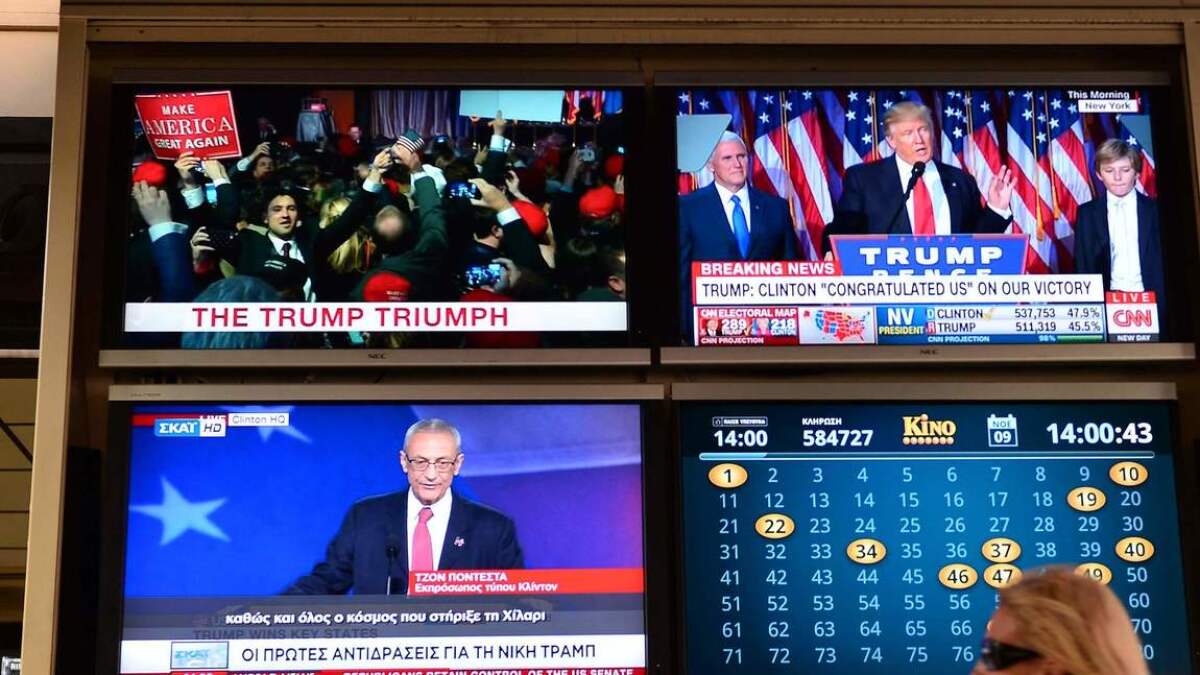
Major U.S. stock indexes were relatively calm Wednesday, well off steep overnight futures losses in the wake of Republican Donald Trump’s surprising presidential election victory.
The Dow Jones industrial average was up about 0.1% in early trading. That was a significant improvement over the 800-point plunge as Trump’s victory became apparent early Wednesday and investors duplicated the initial market turmoil that followed the stunning vote in Britain in June to leave the European Union.
The Nasdaq and Standard & Poor’s 500 indexes both were off slightly in early trading after similar steep futures declines.
“Markets tend to assume the worst and react immediately,” Brad McMillan, chief investment officer for Commonwealth Financial Network, said in a note to clients before the opening bell Wednesday. “Expect an immediate market pullback on fear, and then a pause.”
George H.W. Bush congratulates Trump
Watch Hillary Clinton’s concession speech after Donald Trump’s stunning win

A portion of Hillary Clinton’s concession speech.
Incoming GOP assemblyman believes climate change is good because it hurts ‘our enemies’
Randy Voepel, who was running unopposed for a state Assembly seat to represent suburban San Diego, made it official Tuesday night.
Voepel, a Republican who has expressed controversial views on climate change, homeless people, smoking and China during his 16 years as mayor of Santee, had tallied 65.7% of the vote with 92.7% of precincts reporting Wednesday morning, and the Associated Press called the race for him. Voepel’s opponent had dropped out in the spring, but still finished second to Voepel in the June primary.
In a recent interview with The Times, Voepel reaffirmed a previous comment that he believed climate change was good because it hurt enemies of the United States.
“Most of the Muslim nations are in the hot areas of the world,” Voepel said.
Will Trump lock Clinton up? Maybe not
Donald Trump’s supporters shouted, “Lock her up” at rallies. Trump himself told Hillary Clinton during a debate that she would be in jail if he were running the country. He has suggested through the campaign that he would aggressively prosecute Clinton for mishandling classified information.
Will he?
It seems that the president-elect, in his effort to offer an olive branch to panicked Democrats and calm a jittery nation, may not launch his administration by moving to jail his political rival. Campaign manager Kellyanne Conway said such vengeance was not part of the conversation as he declared victory early Wednesday.
“We didn’t discuss that last night,” Conway said on CNN, recounting her talk with Trump after Clinton called him to concede. “And he did not discuss that with Hillary Clinton on the phone.”
Conway suggested it was time to infuse more civility into the nation’s political discourse.
“We need unity,” she said. “I really hope some people will just tamp it down, lay down the verbal fireworks and give this guy a chance.”
Five things Trump says he will do in Washington
Donald Trump’s plans may lack detail, but he built his campaign around a few big promises that he is almost certainly going to forge ahead on. They represent a drastic shift in direction for the country and a rolling back of signature Obama administration achievements. With his party in full control of Congress, there is little standing in the way of Trump moving forward with much of his agenda. Here are five things to watch for:
Build the wall: The proposal to build a massive wall on the border with Mexico was a central promise of the Trump campaign. However unlikely it may be that such a wall effectively blockades the border – or is bankrolled by Mexico, as Trump has vowed – it’s a pledge Trump cannot walk away from. Trump’s broader immigration plan is more complicated. While his election undoubtedly puts on ice the loosening of immigration laws championed by Obama, the Trump proposal to deport millions of immigrants here illegally will immediately be met by logistical challenges and bipartisan political opposition that could prove insurmountable. Trump himself has walked back from his call to ban all Muslims from entering the country. Though he has vowed “extreme vetting” of immigrants from nations coping with terrorism threats.
Repeal Obamacare: Congressional Republicans have tried multiple times to push through legislation killing Obamacare. This will cause an outcry on the left and wreak havoc in the states, particularly as Republicans have not offered an alternative that would prevent the millions of Americans newly insured through the program from losing access to care. But the legislation is teed up and ready to go. And Trump has promised to sign it.
Retreat on climate change: Trump has called climate change a hoax. He is deeply critical of the green energy mandates that Obama has imposed through aggressive executive action. And he has promised a revival of the coal industry. He has promised to make a big push back toward fossil fuels. Environmentalists lack the support in Congress to stop him.
Renegotiate trade: The massive Pacific trade deal Obama negotiated is effectively dead with Trump’s victory. Trump is also targeting existing trade pacts, including the North American Free Trade Agreement. Trump won election by crusading against globalization. Business leaders fear his plans to renege on existing deals will touch off a trade war.
Reclaim the Supreme Court: Trump will move quickly to fill the vacancy left by Justice Antonin Scalia’s death with an equally conservative jurist. Democrats lack the clout in the Senate to effectively stand in his way of restoring the conservative majority.
State Democrats are closing in on a supermajority in the Assembly, but falling short in the Senate
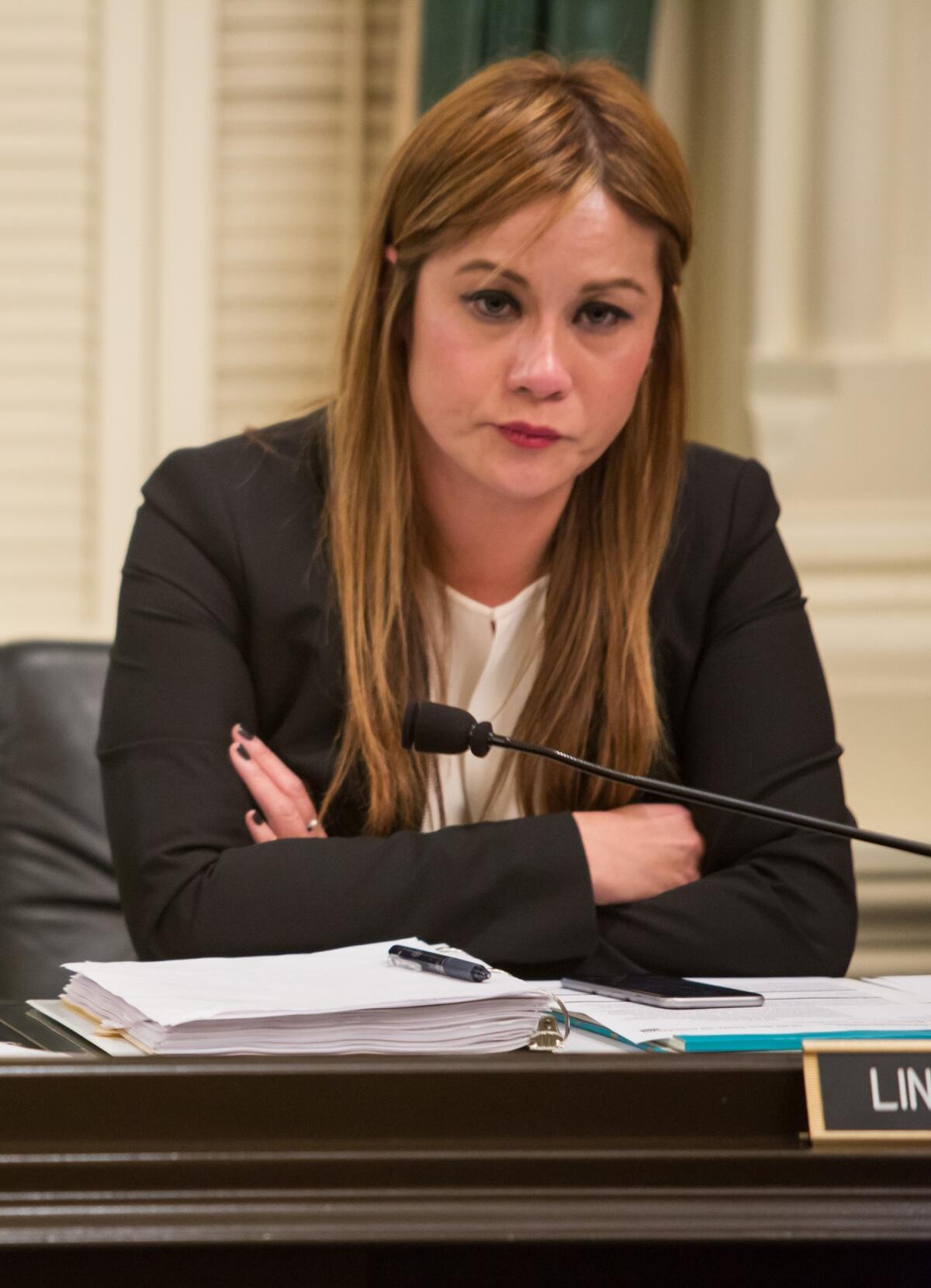
California Republicans appear to be blocking a Democratic supermajority takeover of the state Legislature, according to returns Wednesday.
Assemblywoman Ling Ling Chang (R-Diamond Bar) is leading Democrat Josh Newman by fewer than 2 percentage points — 3,887 votes — with all precincts reporting in the race to replace outgoing Republican state Sen. Bob Huff. Should Chang’s lead hold, Democrats would fall one vote short of the 27 they need for a supermajority in the Senate.
In the Assembly, Democrats are leading in 55 races, which would give them one more than they need for a supermajority in that house. The closest race between the two parties is in Anaheim, where Democrat Sharon Quirk-Silva leads by fewer than 2 percentage points — 1,542 votes — with all precincts reporting in her bid to oust Republican Assemblywoman Young Kim.
With a supermajority, a political party can raise taxes, place measures on the statewide ballot, enact laws immediately with an “urgency” clause and override a governor’s veto.
RNC chair: Trump is ‘not calling for mass deportation’
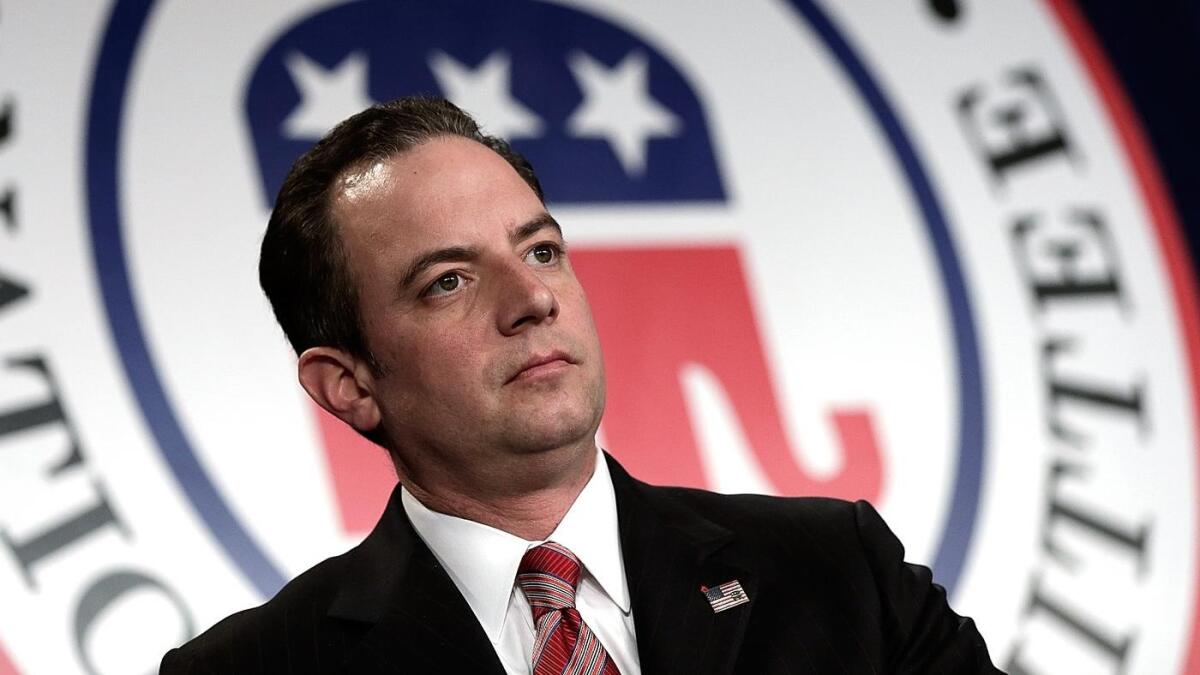
Donald Trump won’t call for a mass deportation of people in the U.S. illegally, Republican National Committee Chairman Reince Priebus said hours after Trump won the presidential race.
“He’s not calling for mass deportation,” Priebus told MSNBC’s “Morning Joe.”
Trump had backed off his plan to forcibly deport some 11 million immigrants here illegally. Priebus reiterated that stance and added that Trump likes to make deals that bring people together, not tear them apart.
“He wants to protect the sovereignty of America and be a friendly partner with the rest of the world,” he said.
Republican leaders in Congress kept their distance from Trump, but now they’re ready to work with him
Top Republicans in Congress did not fully embrace Donald Trump as their party’s presidential nominee.
But after securing the GOP majority on Capitol Hill, they quickly congratulated the president-elect, expressing an eagerness Wednesday to tackle party priorities with a unified GOP government after the brutal election.
House Speaker Paul D. Ryan called Trump’s victory “a great night for our party, and now we must turn our focus to bringing the country together.”
“We are eager to work hand-in-hand with the new administration,” Ryan said.
Sen. Mitch McConnell, the Republican majority leader, said “the American people have chosen a new direction for our nation.”
“President-elect Trump has a significant opportunity to bring our nation together,” McConnell said.
House Majority Leader Kevin McCarthy promised results from one-party government in Washington.
“Donald Trump and congressional Republicans will deliver,” the Bakersfield Republican promised.
And Republican Sen. Ted Cruz congratulated his former rival on a victory that “astonished the pundits” as the Texan sought to play a key role in advancing a conservative agenda.
“I look forward to working with the new administration,” Cruz said, citing a long list of priorities — repealing Obamacare, clamping down on illegal immigration and confirming conservative judges.
“I am eager to help lead the fight in the Senate to pass the conservative agenda that President-elect Trump promised to the American people.”
With 69.8% of vote, L.A. Metro expansion measure lead widens

An audacious plan to dramatically expand Los Angeles County’s mass transit network is leading, amassing support of 69.82% from voters with all precincts reporting.
That’s more than the 66.67% requirement to approve the sales tax increase to fund $120 billion in transit improvements over the next four decades, which would in part fund a large expansion of the system’s rail network.
An unknown number of vote-by-mail and provisional ballots still need to be tallied.
That percentage of support, however, surpasses the proportion of voters who backed a similar sales tax increase eight years ago, when 67.93% of voters backed Measure R.
The proposal has the potential to transform a traffic-choked region that began building a modern rail network decades after other U.S. cities. The tax revenue would fund the construction of nearly a dozen new rail lines, including twin rail tunnels through the Sepulveda Pass and new connections to Pacoima, Claremont, Artesia and Torrance.
At a joint victory party Tuesday night for several local ballot measures, Los Angeles Mayor Eric Garcetti — Measure M’s most visible advocate — took the stage to applause.
“There is nothing to be depressed about in Los Angeles when we wake up tomorrow,” Garcetti said Tuesday night. Local races, he said, showed a county “that is willing to take on the toughest challenges,” including congestion, homelessness and funding for higher education.
Friedman wins in 43rd Assembly District
Glendale City Councilwoman Laura Friedman has emerged victorious in her bid against Glendale City Clerk and fellow Democrat Ardy Kassakhian.
Friedman garnered 65.2% of the vote compared to Kassakhian’s 34.8% with all precincts reporting, and the Associated Press has called the race.
Both were competing to replace termed-out Assemblyman Mike Gatto (D-Glendale), who endorsed Friedman.
Part of Friedman’s campaign strategy hinged on the need to elect more women to the state Legislature. Kassakhian was expected to benefit from mobilized Armenian American voters, who make up 15% of registered voters in the area and who have been highly organized in past races.
The race brought more than $3.2 million in independent expenditures and a deluge of mailers to voters’ mailboxes, mostly by a committee called the Parent Teacher Alliance, funded by the California Charter Schools Assn.’s advocacy group.
Kassakhian sharply criticized the expenditures as “dirty tactics” from a “sham group” that was trying to pass itself off as the Parent Teacher Assn.
Times staff writer Liam Dillon contributed to this report.
L.A.’s ambitious plan to tackle homelessness has overwhelming lead

Los Angeles’ ambitious plan to tackle the intractable homelessness problem with a borrowing measure worth $1.2 billion had an overwhelming lead in the vote Wednesday morning, and its supporters have declared victory.
With all precincts reporting, Measure HHH had secured 76% of the vote, well above the 66.67% threshold it needed to pass.
An unknown number of vote-by-mail and provisional ballots still need to be counted.
The measure would tax Los Angeles’ property owners to provide housing for the homeless, and would accelerate the pace at which mostly nonprofit developers build permanent supportive housing for chronically homeless people. The bonds will be repaid by a new property tax averaging just under $10 for each $100,000 in assessed valuation over 29 years.
City officials who placed the measure on the ballot say it will help fund 1,000 apartment units a year for 10 years. Los Angeles County will provide the support services for the city housing.
Supporters of the measure declared victory earlier Tuesday night. “We earned our wings tonight. We completely lived up to the title City of Angels,” said Councilman Marqueece Harris-Dawson.
Janice Hahn has big lead in 4th District supervisor race to succeed Knabe

Janice Hahn is dominating the race to replace Los Angeles County Supervisor Don Knabe, who represents southern Los Angeles County, securing 56% of the vote with all precincts reporting.
An unknown number of vote-by-mail and provisional ballots have yet to be counted.
U.S. Rep. Hahn, a Democrat from San Pedro, faced a tough fight with rival Napolitano, a Republican and former Manhattan Beach councilman who has worked for Knabe for 12 years.
Hahn would be the fourth labor-backed liberal on the officially nonpartisan five-member board — constituting a supermajority that could make it easier to approve tax and salary matters favored by the county’s most powerful unions. Knabe and Michael D. Antonovich — the two Republicans on the board — are being forced out by term limits.
Knabe, a resident of Cerritos, was first elected to the Board of Supervisors in 1996.
L.A. County tax measure for parks, Measure A, has substantial lead
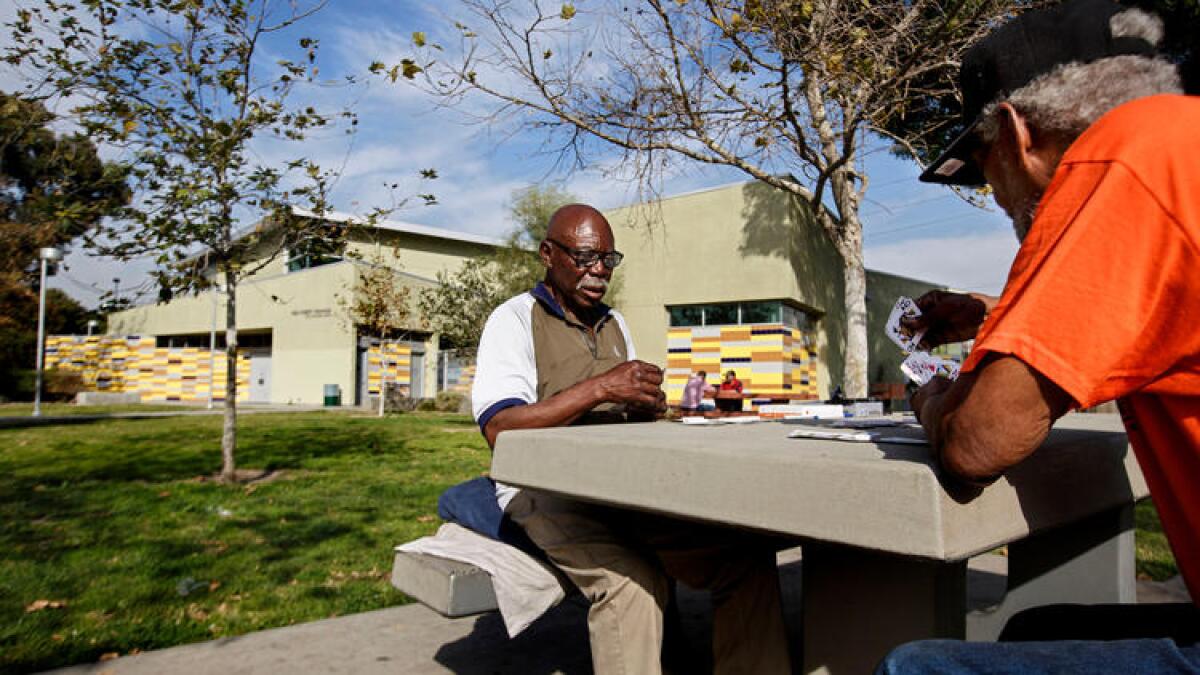
A Los Angeles County ballot measure asking voters to tax themselves for park improvements has a big lead.
With all precincts reporting, Measure A is leading with 73.49% of voters in support of the ballot initiative. It requires a 66.67% vote to pass.
Measure A would impose a county tax on improved property, at a rate of 1.5 cents per square foot of building area – about $22.50 a year for a 1,500-square-foot house – and bring in $94.5 million a year, without an end date.
It would replace a county tax that passed in 1992 but expired last year, and another one adopted in 1996 that sunsets in two years. Those taxes have been the primary source of parks funding not just in the county’s system but for most of the region’s 88 cities.
The initiative is the county’s second recent attempt at persuading voters to tax themselves to pay for parks, recreation, open spaces, neighborhood recreation and senior centers, and other cultural amenities. A proposed $23 parcel tax for park projects had failed narrowly in 2014.
In preparation for the second attempt, county officials commissioned a study of open space needs throughout the county, which found large disparities in park access. Countywide, there was an average of 3.3 acres of parkland per 1,000 residents. Communities in Central and South Los Angeles, southeast county areas and parts of the San Fernando and San Gabriel valleys had the most park-poor areas.
Scott Wiener wins San Francisco state Senate district
San Francisco County Supervisor Scott Wiener has prevailed in his bid for state Senate against fellow Democrat and county supervisor Jane Kim.
Wiener will replace outgoing Sen. Mark Leno (D-San Francisco).
Wiener led with 52.5% of the vote with all precincts reporting.
The intra-party battle between Kim and Wiener was one of the most expensive in the state. Outside groups spent nearly $3.6 million to sway the outcome, with charter school advocates and business groups lining up behind Wiener and labor unions and renter’s unions supporting Kim.
Wiener was widely thought to be a potential addition to the Legislature’s band of moderate, business-aligned Democrats if elected.
Times staff writer Liam Dillon contributed to this story.
Measure CC, to raise $3.5 billion for L.A. community college construction, has big lead
Measure CC, a $3.5-billion construction bond for the Los Angeles Community College District, appeared to be on track to pass early Wednesday morning.
With all precincts reporting, the measure was securing 75% of the vote, far better than the 55% majority needed to pass. An unknown number of vote-by-mail and provisional ballots still have not been counted.
Supporters say the money is necessary to complete renovation efforts that began with earlier bond measures. Projects to be completed include earthquake-safety upgrades and better access for disabled students.
“I have to think that voters are going to support Measure CC,” said Joanne Waddell, president of Local 1521 of the American Federation of Teachers, which represents 5,000 faculty members on the nine college district campuses.
“We’ve been transforming our campuses and this will take us to the next step in that transformation. Our students deserve this.”
Opponents pointed to problems that arose with the spending of money from bond measures adopted in 2001, 2003 and 2008, which residents are still paying off, and questioned why more money is needed. Past projects were beset by mismanagement, waste and nepotism, as The Times detailed in 2011.
College officials insisted that their efforts have improved and are overseen by new and professional leadership, with better accountability measures.
One of the district’s biggest changes was to strip away from individual college presidents the power they formerly had over design and construction, and to centralize that authority with the district’s administration.
Voters backing more fire patrols in the Hollywood Hills and Santa Monica Mountains
With all precincts reporting, two tax measures that would enable more ranger and fire patrols in increasingly popular areas along the Hollywood Hills and Santa Monica mountains are leading by wide margins.
Measure FF calls for an annual $15 tax on developed parcels of land that are within a special hillside district covering parts of Woodland Hills, Encino and Tarzana. Measure GG would impose a $35 tax on similar parcels west of Griffith Park but east of the 405 Freeway. Only voters in these districts saw these two measures on their ballots.
With all precincts reporting, Measure FF is leading with 76.48% of voters in support. Measure GG is similarly leading and 83.71% are backing the initiative. Both measures require a two-thirds vote to pass.
An unknown number of vote-by-mail and provisional ballots have yet to be counted.
It is important to increase ranger and fire patrols in these areas, such as the seven-mile unpaved section of Mulholland, park officials said. Visitors to these quiet, mostly residential areas have increased because of apps such as Waze and social media photos that have made them more widely known, they said. The chances of car exhaust sparks or a carelessly tossed cigarette in these under-patrolled, tinder-dry areas have become an increasing concern.
Five major state Senate races yet to be called, but only one appears tight
L.A.’s Measure SSS, which would consolidate police pension systems, is slightly ahead

A measure that would allow airport police officers to join the pension plan of other city police officers and firefighters was slightly ahead early Wednesday.
With 99.82% of precincts reporting, 50.28% of voters were backing Measure SSS. That was a reversal from an earlier tally, when 50.2% of voters opposed the measure.
An unknown number of vote-by-mail and provisional ballots remain to be counted.
Measure SSS would move new hires at the L.A. Airport Police Department into the same pension plan as other police and fire department employees in the city. It also would allow current airport officers, about 500 in all, to buy their way into this pension fund. Currently, airport police are part of the city’s general pension system for municipal workers.
If this measure passes, eventually all the police officers in the city’s three separate police departments — LAPD, the L.A. Port Police and the airport officers — would be members of the same pension fund, receiving comparable retirement benefits. They are already paid on the same salary scale.
Critics pointed out that the police and fire system allows for retirement at 50 and other more generous pension terms. Moving the airport employees into it would increase the financial burdens on an already strained system.
L.A. measure to reform DWP trailing
A measure to revise the oversight and operations of Los Angeles’ city-owned water and power utility slipped behind in the vote tally early Wednesday.
With 99.82% of precincts reporting, Measure RRR, to reform the Department of Water and Power, was opposed by 51.68% of voters. The count does not include an unknown number of vote-by-mail and provisional ballots.
Measure RRR is a long and detailed, but not sweeping, set of changes to the utility. Supporters say it would give the DWP more independence in a way that would make the municipally owned utility “more accountable, transparent and responsive,” as described in the city’s official ballot argument.
Backers were concerned about the possible impact of a disclosure days before the election. It came to light that the measure would allow Fred Pickel, executive director of the city’s Office of Public Accountability, to be appointed to a second five-year term in his $276,000-a-year job as watchdog over the DWP. It also would double the minimum budget of his small department.
Pickel was responsible for submitting the wording of the ballot summary for voters and did not include these details.
Measure backers say it’s important to boost Pickel’s budget to ensure his independence and insulate him from political meddling.
The measure is endorsed by Mayor Eric Garcetti, the City Council and DWP management, who hope it will streamline operations at the roughly $4-billion-per-year department that keeps the lights on and faucets flowing for millions.
Opponents agree that the DWP, which has been plagued by controversy, needs reform. But they argue the ballot measure would be a step backward, allowing elected officials to avoid responsibility for missteps by the department and DWP managers.
Republican Cunningham wins tight state Assembly race to hold a GOP seat
Republicans have held on to the 35th Assembly District on the central coast, with GOP candidate Jordan Cunningham defeating Democrat Dawn Ortiz-Legg, according to the Associated Press.
Cunningham led Ortiz-Legg 54.6% to 45.4% with all precincts reporting.
The two were running to replace termed-out Assemblyman Katcho Achadjian (R-San Luis Obispo), who ran for Congress but was knocked out in the June primary.
The Republicans’ 5% voter registration advantage four years ago is now at just 1.5%, with a significant number of Latino and Asian registered voters.
Times staff writer Liam Dillon contributed to this story.
Proposition 51, the $9-billion school bond, wins
California voters have approved Proposition 51, a $9-billion bond for school construction projects across the state.
The measure was leading 53.9% to 46.1%, according to election returns at 5 a.m. Wednesday, and the Associated Press has called the victory.
State funding to help finance repairs and new school facilities across California had run dry, and Proposition 51 will refill the pot. School construction needs billions of dollars every year, according to the nonpartisan Legislative Analyst’s Office. With the new cash infusion, the state will once again match local district funding for construction projects.
Proposition 51 had a more difficult campaign than many might have expected. Critics of the measure, notably Gov. Jerry Brown, had argued that Proposition 51 unfairly prioritized larger more, affluent areas because the state handed out the money on a first-come, first-served basis to districts that already had matching funds. And public polls in the fall showed the measure not reaching majority support among voters.
But school bonds are popular. Eighty percent of local measures pass, according to the League of California Cities, and the previous four statewide school bonds were successful as well.
Voters backing Burbank airport terminal replacement

A measure to allow the replacement of the aging, cramped and seismically deficient Hollywood Burbank airport is ahead by a large margin.
With all precincts reporting, 69% of voters backed Measure B. An unknown number of vote-by-mail and provisional ballots has not yet been counted.
Measure B would permit the construction of a 14-gate replacement terminal at what was formerly known as Bob Hope Airport in a plan supported by both airport officials and a majority of the Burbank City Council.
Opened 86 years ago, the Burbank airport terminal is considered outdated and obsolete, so close to the runway it does not meet federal safety standards. It also is vulnerable to heavy damage in a major earthquake.
Airport and Burbank city officials have openly feuded about the terminal’s future for decades, and this agreement would finally pave the way for a replacement.
A rejection of Measure B would likely result in an ongoing legal battle between the airport and the city, and the airport authority could attempt to build a terminal of the same size in a less favorable area, one that would force the demolition and replacement of the general aviation terminal.
Seven major Assembly races still undecided, but only one appears close
Looks like Clinton will win the popular vote despite losing in electoral college
Votes are still being counted across the country, but it appears Democratic nominee Hillary Clinton could win the popular vote, while President-elect Trump wins the electoral college and thus the White House.
At 5 a.m. on the West Coast, the Associated Press showed Clinton with 59.16 million votes nationally, compared to Trump’s 59 million votes.
If that holds true as the remaining precincts report their ballots, it would mimic the 2000 results, where Democrat Al Gore narrowly won the popular vote, but George W. Bush won the White House.
How does that happen? When people cast their votes in the presidential election, they are actually casting votes for “electors,” who then cast their votes for president.
The candidate who wins the state’s popular vote gets those electors.
The number of electors each state has is equal to its representation in Congress, so with its 53 House members and two senators, California has the largest share with 55 electors.
There are still a handful of states where precincts haven’t reported so the popular vote could change, but it isn’t expected to be enough to change the electoral vote, or the election’s outcome.
At 5 a.m., the Associated Press showed California had 1,644 precincts that hadn’t fully reported. Clinton led the state 5.4 million votes to 2.9 million votes.
Other states with outstanding precincts included Alaska, Arizona, Oregon, Michigan, Minnesota, New Hampshire and Washington.
Voters opposing huge tower in Beverly Hills, slow-growth measure in Santa Monica
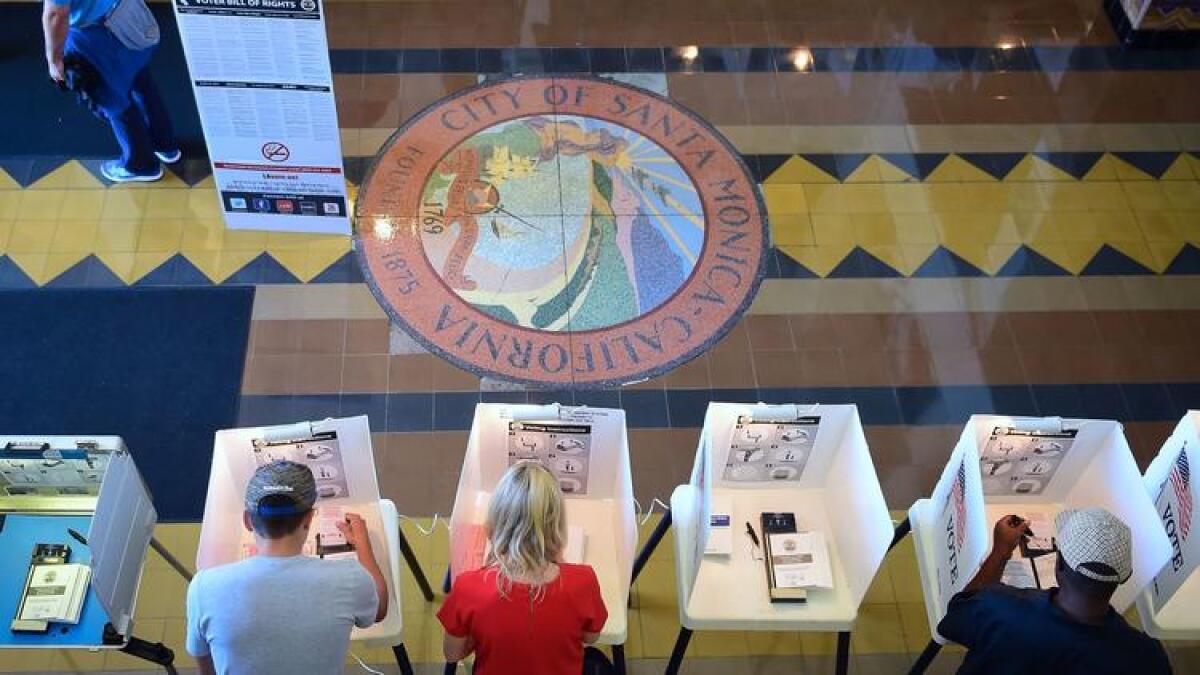
Voters on the Westside appeared to be rejecting two contentious development measures -- an effort to erect the tallest building in Beverly Hills and a bid to impose a strict slow-growth measure in Santa Monica.
Measure HH in Beverly Hills was sponsored by developer Beny Alagem, who sought to bypass city officials and secure permission directly from voters for a $700-million redevelopment project that includes a 26-story tower at the site of the Beverly Hilton Hotel.
It was an unprecedented measure on the ballot. Local authorities said it was the first time voters had been asked to consider approving a project that wasn’t fully vetted first by planning commissioners and the City Council.
With all precincts reporting, 55.75% of voters opposed Measure HH. An unknown number of vote-by-mail and provisional ballots have yet to be counted.
In Santa Monica, 56.19% of voters were rejecting what would be one of the strictest slow-growth measures in the region. Measure LV would require voter approval for most development projects taller than 32 to 36 feet. That threshold would cover many new apartment and condo developments, as well as office and retail projects.
The votes came as both cities considered how best to manage urban growth, a hot-button issue in Los Angeles and many other areas. Many say the measures in Beverly Hills and Santa Monica offer a preview of a much larger debate brewing in Los Angeles, where voters in March will consider growth limits.
Trump win ignites investor sell-off, rattling markets worldwide
Donald Trump’s election is rattling financial markets around the globe.
Investors are expressing deep concerns as they contemplate how a Trump administration will affect the economy. Trump’s vows to upend the economic system and change policies that have driven major investments by corporations sent markets tumbling overnight, though they recovered slightly this morning.
His pledges to renegotiate major trade agreements, retreat from President Obama’s aggressive green energy agenda and impose tough new immigration measures have major businesses facing a drastically different landscape than the status quo they were expecting if Hillary Clinton won.
Markets like predictability, and the American presidential election has created exactly the opposite in the world. Even though Trump’s agenda is friendlier to Wall Street than the one Hillary Clinton ran on – with his promises of tax cuts, easing of federal regulations and more incentives for business – big investors largely saw him as a risk throughout the election. They fear his bluster will upset relations with other countries, his vague policy proposals leave too much uncertainty, and his pledge to tear apart trade deals could devastate their global supply lines.
As the Trump victory loomed early this morning, it set off a frantic sell-off worldwide. Hillary Clinton’s concession enabled Dow futures to recover somewhat after an initial plunge of more than 800 points, but they were still down by around 350 points before the New York Stock Exchange opened Wednesday. At one point, the Mexican peso had fallen more than 10% against the dollar. Predictably, investors rushed to the safety of gold, sending its price up.
There was one place where markets were not rattled at all. In Russia, where President Vladimir Putin welcomed the election of Trump after a race in which he had been accused of meddling, markets were stable.
Kathryn Barger has huge lead in 5th District supervisor race for northern L.A. County
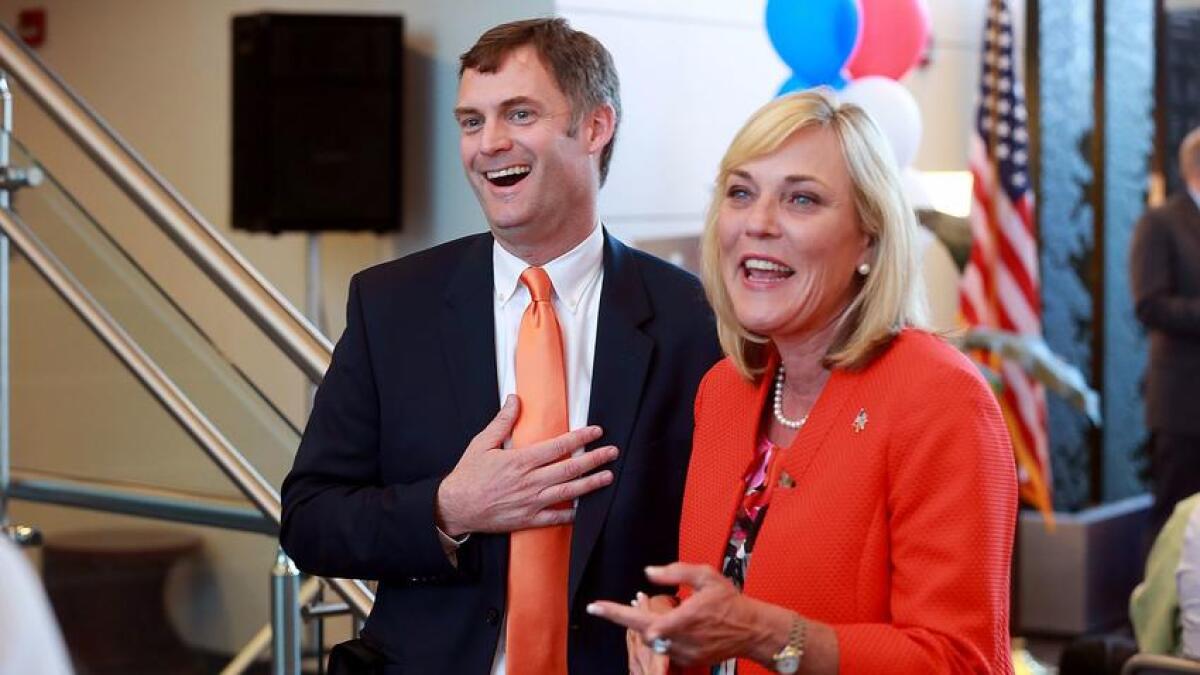
Kathryn Barger held a dominating lead in the race to replace Los Angeles County Supervisor Michael D. Antonovich, who represents northern Los Angeles County.
With all precincts reporting, Barger claimed 59% of the vote, while her opponent, Darrell Park, received 41%. An unknown number of vote-by-mail and provisional ballots have yet to be counted.
Barger, a moderate Republican, is Antonovich’s longtime chief of staff, and started working for Antonovich as an intern 28 years ago. She has the backing of four of the county’s five supervisors as well as the support of powerful labor groups, including the Los Angeles County Federation of Labor.
Her opponent, Park, has campaigned heavily on his Democratic Party affiliation. Park is a green-energy entrepreneur and former staffer in the White House Office of Management and Budget under Presidents Clinton and George W. Bush.
Antonovich, a Republican who has held his seat on the Board of Supervisors since 1980, is being forced out by term limits that were approved by voters in 2002.
President-elect Trump makes his win official on Twitter
Donald Trump wasted no time in changing the bio and image on his Twitter account.
The morning after winning the 2016 presidential election, Trump changed his title to “President-elect of the United States” and the image on his profile to a photo of himself and Vice President-elect Mike Pence against a White House background.
Trump, known for his controversial tweets throughout the election, grew his following to around 13.6 million over the year. He will now have the option of taking over the @POTUS account established by President Obama, according to the White House social media transition report.
“The handle @POTUS will be made available to the 45th president of the United States on January 20, 2017,” according to an Oct. 31 post on the White House blog. “The account will retain its more than 11 million followers, but start with no tweets on the timeline.”
The National Archives and Records Administration (NARA) will archive all of Obama’s tweets on the new handle @POTUS44. Trump’s administration will also gain access to the Instagram, Medium, Tumblr, YouTube and other Twitter accounts, but the NARA will archive the current content and wipe it before the Trump administration takes over.
Obama congratulates President-elect Trump in early morning phone call
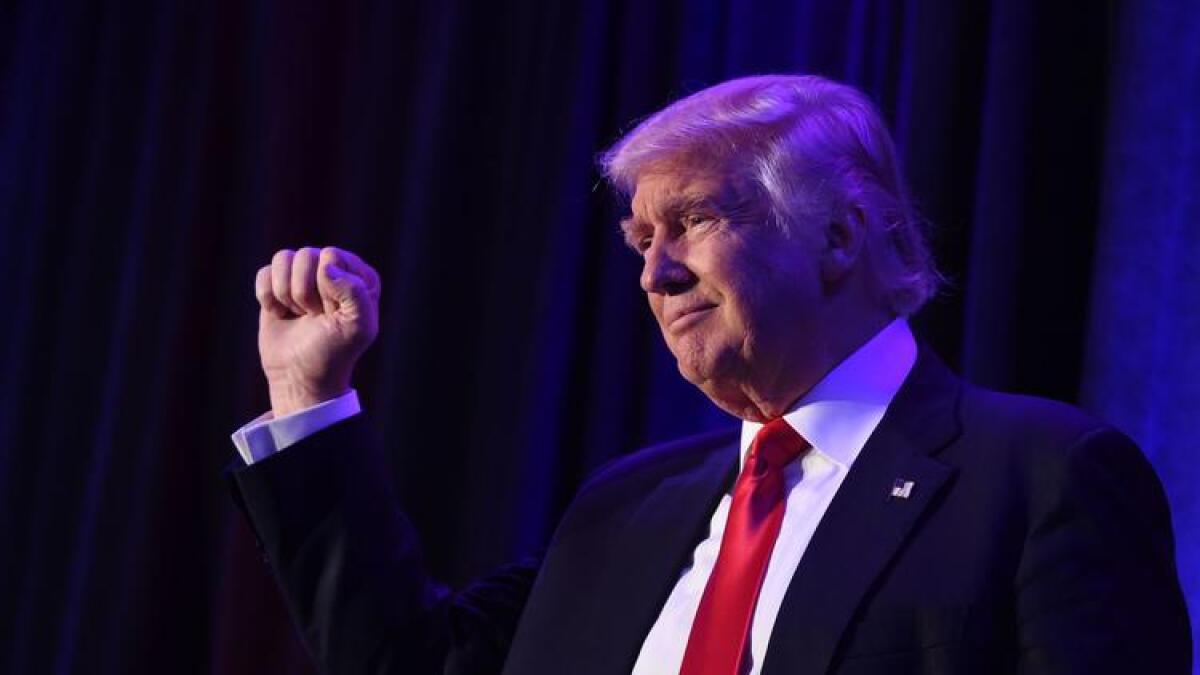
President Obama called President-elect Trump in the early morning hours to congratulate him on Tuesday’s win, according to the White House.
Obama plans to make a statement Wednesday at the White House to discuss the election results and what the country can do to come together.
He also invited Trump to meet with him at the White House on Thursday to update the incoming president on the administration’s transition plans.
Obama also called Democratic nominee Hillary Clinton to thank her for her campaign, according to the White House.
Trump issues first tweet as president-elect
San Francisco measure to allow noncitizen parents to vote in school board elections leading
A measure to allow noncitizen parents to vote in San Francisco school board elections was ahead, with all precincts reporting.
Proposition N garnered 53% of the vote. Still to be counted are late-arriving vote-by-mail and provisional ballots.
Proposition N would allow noncitizens living in San Francisco to vote for school board members if the person is a parent, legal guardian or legally recognized caregiver of a child living in the city. The noncitizen must be of legal voting age and not in prison or on parole for a felony conviction.
The measure would go into effect for the November elections in 2018, 2020 and 2022, and would expire after that unless the Board of Supervisors adopts an ordinance allowing it to continue.
San Francisco measure to allow 16-, 17-year-olds to vote is trailing

A measure that would lower the voting age and allow 16- and 17-year-olds to vote in municipal elections in San Francisco was trailing Wednesday morning.
With all precincts reporting, Proposition F was opposed by 53% of voters. Late-arriving vote-by-mail and provisional ballots still need to be counted.
If approved, younger teenagers would be allowed to vote for school board and community college board members, and for local candidates and local ballot measures. The city controller estimated the number of registered voters would probably increase by up to 1%, if 16-year-olds and 17-year-olds vote at the same rate as the general population.
Supporters say Proposition F would encourage civic participation — the earlier someone starts voting, the more likely they are to vote for the rest of their life, they argued.
Opponents say adolescents shouldn’t have the privilege of voting, as many of them don’t have the daily responsibilities that adults do.
Rep. Tony Cardenas wins a third term in the 29th District
Rep. Tony Cardenas won his race against former L.A. City Councilman Richard Alarcon, and will serve a third term representing the San Fernando Valley in the 29th District.
Alarcon did not run a campaign after coming in second in the June primary, telling The Times in mid-October that he thought it “would be difficult, if not impossible, for me to raise money and explain to my contributors a path to victory.”
Alarcon entered the race weeks after his convictions of voter fraud and perjury were thrown out.
In April, prosecutors announced that they would retry Alarcon and his wife, Flora, for the original convictions that landed him 51 days of house arrest and barred him from holding state office ever again. A motion to dismiss the case was scheduled to be heard just days before the election.
Alarcon said he got in the race so there would be a viable Democrat if Cardenas became embroiled in a rumored FBI investigation that led to the subpoena of one of the congressman’s staffers. Earlier this year, Cardenas reported spending 40% of his reelection fund on legal fees, but his attorney denied Cardenas was the focus of the probe.
O.C. Supervisor Andrew Do appears headed for win over Michele Martinez in contentious race
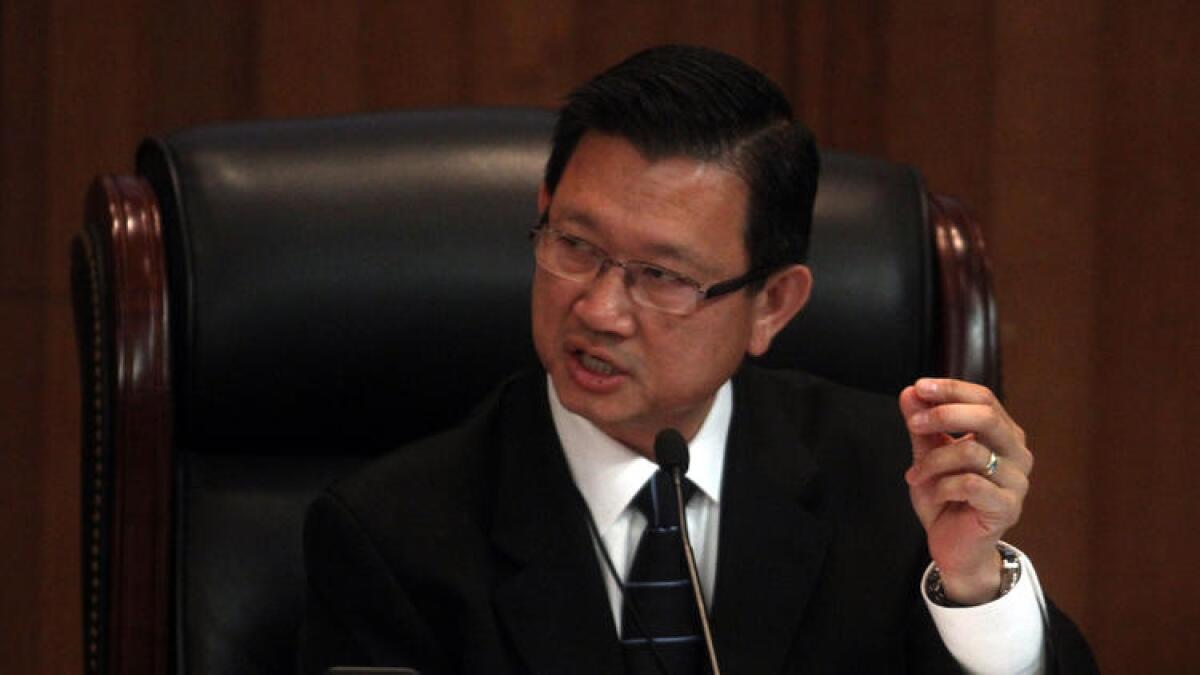
Orange County Supervisor Andrew Do has a substantial lead over challenger Michele Martinez in the race to represent the county’s most liberal district, with Do securing 53% of the vote with all precincts reporting.
The contentious race likely came down to the district’s respective turnout in its large Vietnamese American and Latino communities. The two emerged as the top vote-getters in a heated June primary race, with Do winning 38% of the vote and Martinez 34%, according to the final tally.
Experts say the competition between Do and Martinez reflects the changing demographics of central Orange County, where candidates must look well beyond traditionally white voters to win — and where they increasingly have to leverage their cultural connections to many of the residents they seek to represent.
Countywide, the 1st District is the most liberal district, with Democrats boasting a 13-percentage-point lead over Republicans in voter registration, according to the Registrar of Voters.
The district spans Garden Grove, Santa Ana, Westminster and parts of Fountain Valley, and it includes 209,000 registered voters, according to Political Data Inc. Among them, 43% are registered Democrats and 30% are Republicans; 37% of the voters are Latinos and 25% are of Vietnamese descent.
If Martinez had won, she would have been the only Democrat on an otherwise all-Republican board. A Santa Ana councilwoman, she was trying to become the first person from her city to represent the 1st District on the Board of Supervisors.
Late-arriving vote-by-mail and provisional ballots still need to be counted.
Trump’s Hollywood star became a scene last night: ‘This is our president’
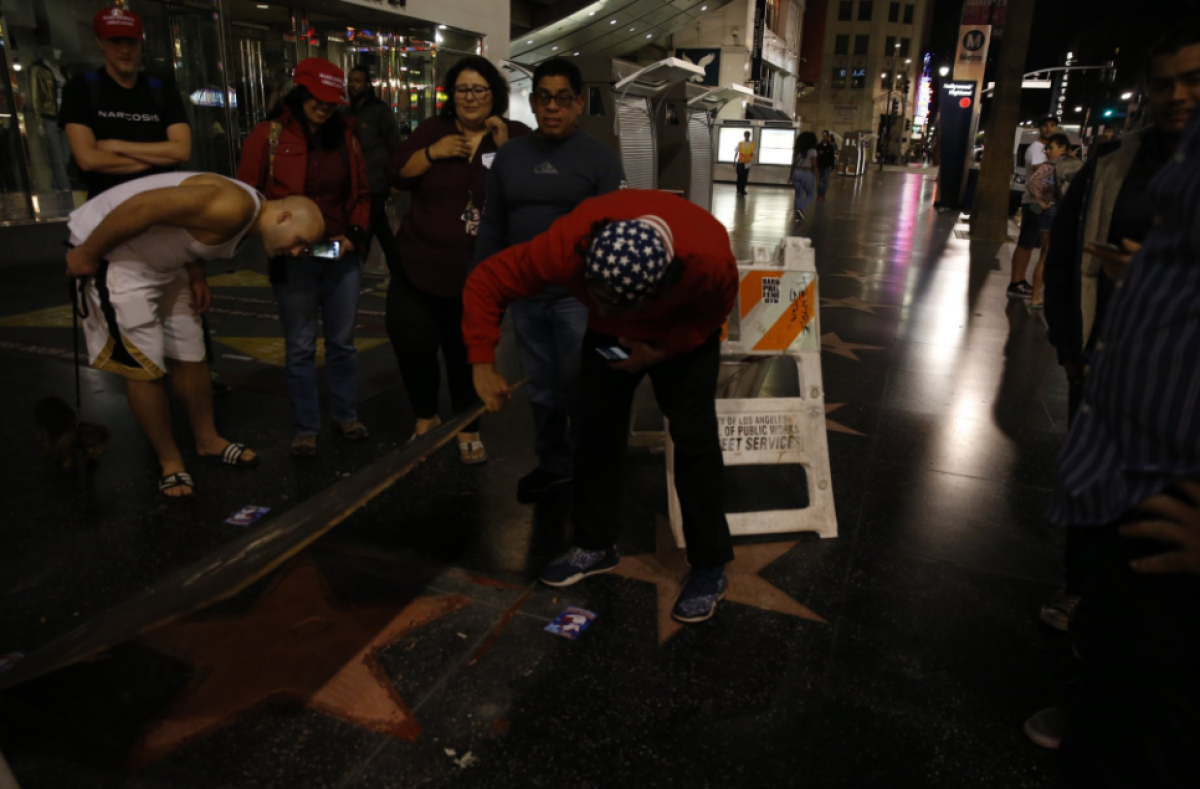
At now-President-elect Trump’s star on the Walk of Fame in Hollywood early Wednesday, a small crowd of about 30 Trump supporters gathered about 1 a.m., posing for pictures and chanting with delight.
“This is our president,” they cheered as they tried to shout down a small band of counter-protesters.
The crowd, many of them wearing the candidate’s signature “Make America Great Again” hats, chanted “USA” several times.
Two Los Angeles police officers were posted nearby and moved the crowd apart at one point to return wooden construction materials on top of the star. The wood was installed earlier this year after the spot was defaced.
Diane Mendez, 23, a Trump supporter who volunteered at a polling place, said she came to celebrate what she saw as a turning point.
“He said he would brings job back to America. We all need jobs,” Mendez said. “Who doesn’t need jobs?”
Targeted over a rate hike, Yorba Linda water board incumbents likely to be recalled from office
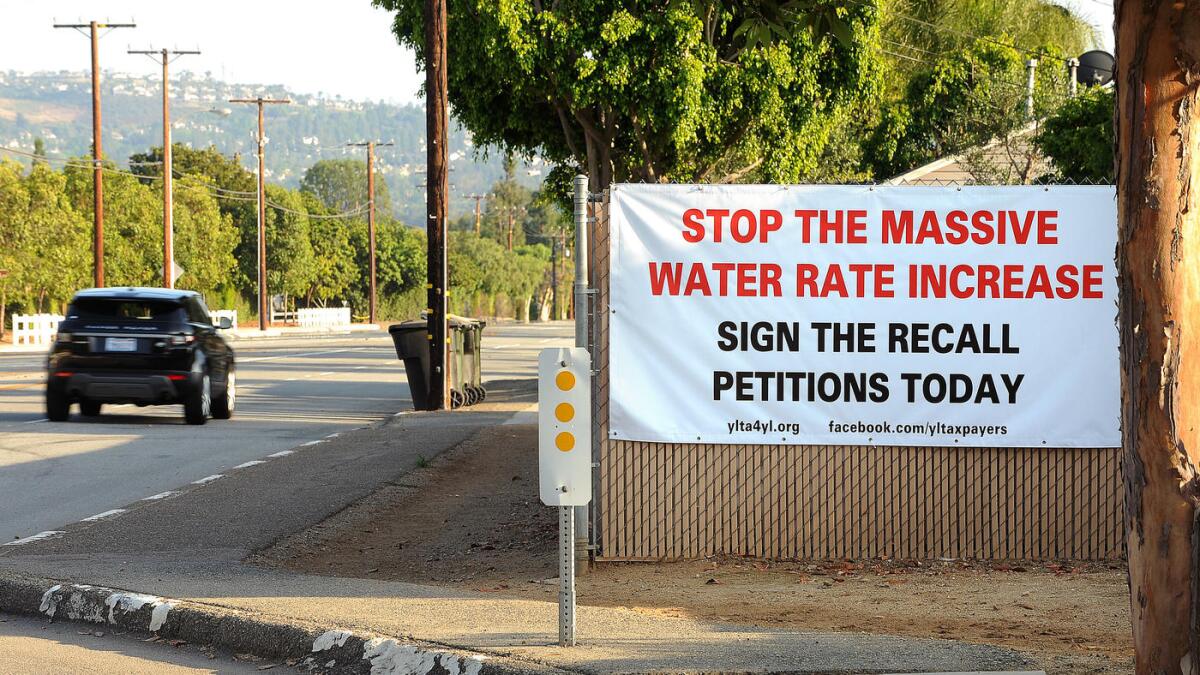
Water board members in an Orange County suburb who backed a water rate hike in the midst of intense drought appeared to be defeated in a recall election.
With all precincts reporting, all three incumbents seeking to stay on the five-member Yorba Linda Water District board were losing. About 71% of voters voted to recall two board members, Gary Melton and Robert Kiley.
And the board’s president, Ric Collett, appeared to be losing his bid for reelection, coming in last place in a field of four candidates in which,only the top two finishers would secure a new term on the board.
The Yorba Linda Water District’s board attracted the ire of the Yorba Linda Taxpayers Assn. when the district unanimously raised bills by $25 a month. The battle has transformed the sleepy suburb into a cautionary case study for other California water suppliers coping with a decrease in water sales during drought.
A fourth incumbent board member, Michael Beverage, said he would not seek another term. The vacant seat is up for grabs between a candidate aligned with the incumbents and a challenger angry at the rate hike.
The Yorba Linda Taxpayers Assn. backed a slate of four candidates: Al Nederhood and Brooke Jones to replace the board members targeted by the recall, and Benjamin Parker and John Miller for the open seats.
Nederhood and Jones led in their races to replace the incumbents, garnering 51% and 72% of the vote so far, respectively, against candidates allied with the incumbents.
For the two open seats, the leaders in that race were Miller, backed by the tax association, and Andy Hall, aligned with the board incumbents. If the results hold up, the outcome would give the tax association-backed candidates a 3-to-2 majority.
Bay Area voters supporting BART renovation and extension to downtown San Jose

Bay Area measures that aim to restore BART and extend the commuter rail system to downtown San Jose were ahead Wednesday morning, appearing to have surpassed the two-thirds majority needed to pass.
Voters in San Francisco, Alameda and Contra Costa counties appeared to back Measure RR, a $3.5-billion bond measure to rebuild the core systems of the aging electric train service, which has been plagued with ancient, faulty power systems and water leaks that have weakened steel rails so much they crack during the commute. With all precincts reporting, Measure RR was garnering 70% of the vote.
In Santa Clara County, Measure B asked voters to raise the sales tax by half a cent for every dollar spent to fund a host of freeway and transit improvements, including funding to bring BART to downtown San Jose, raising more than $6 billion over the next three decades. Measure B was garnering 71% support, with an estimated 48% of the ballots counted.
In San Francisco, voters appeared to reject Proposition K, which would increase the sales tax rate by three-quarters of a penny for every dollar spent. A companion measure, Proposition J, would have set aside about $100 million a year in new tax revenue to pay for repairs, upgrades and infrastructure improvements to Muni and about $50 million to provide services to the homeless. Proposition K was being rejected by 65% of voters.
Yet to be counted are late-arriving vote-by-mail and provisional ballots.
Bay Area soda tax measures head to solid wins
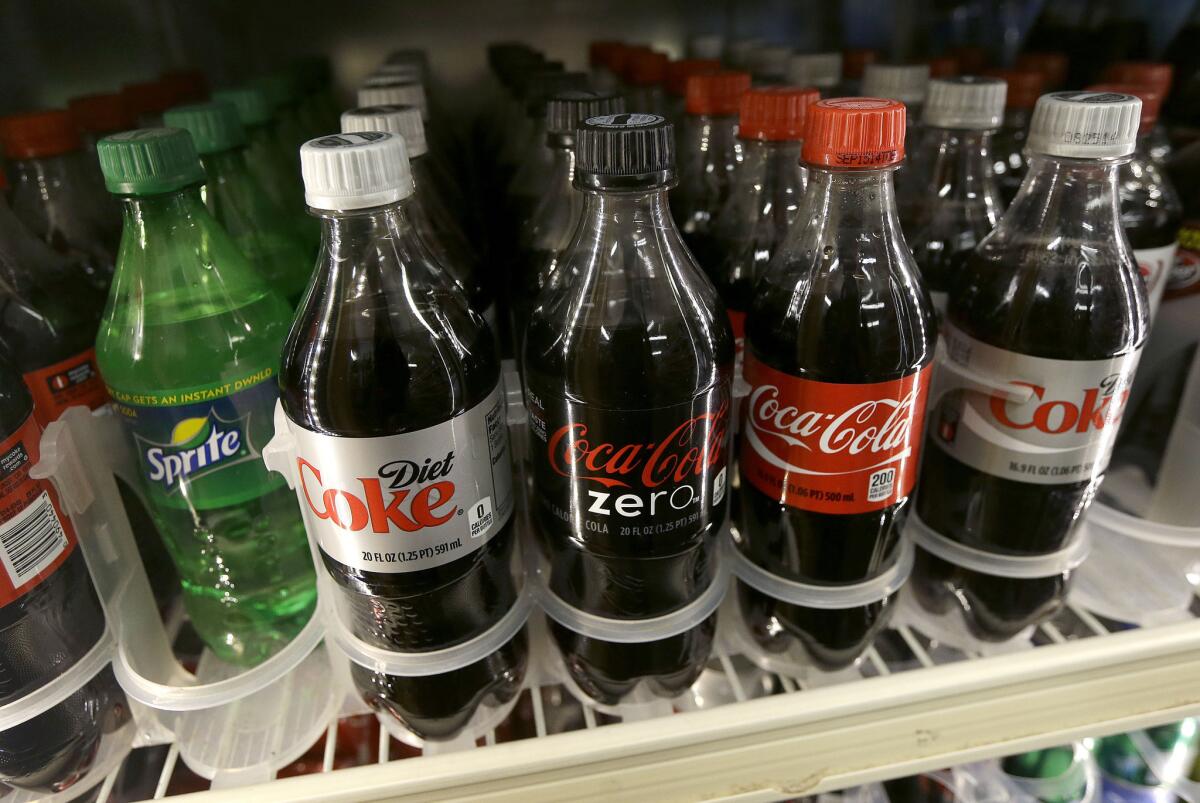
Soda tax measures were headed to victory in Bay Area cities, with all precincts reporting.
The measures, on the ballot in San Francisco, Oakland and the East Bay suburb of Albany, would place a penny-per-ounce tax on sodas and other sugar-sweetened beverages. The measures require a majority vote to pass.
In San Francisco, Proposition V received 62% of the vote, with all precincts reporting. Oakland’s Measure HH had a nearly identical tally, with 61% backing the measure. And in Albany, 71% of voters backed Measure O1.
Yet to be counted are late-arriving vote-by-mail and provisional ballots.
A study published in August reported that after Berkeley’s first-in-the-nation soda tax, Measure D, passed in 2014, lower-income residents reduced their consumption of sugar-sweetened beverages by 21% compared with the pretax days.
Opponents, led by the American Beverage Assn., have called the measures an “unfair grocery tax.”
Soda taxes proposed in El Monte and Richmond in 2012 failed by wide margins.
The L.A. Times’ front page today: ‘STUNNING TRUMP WIN’